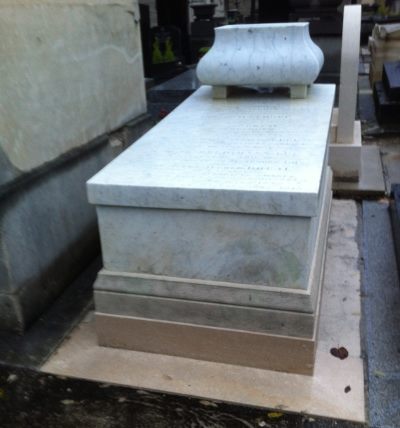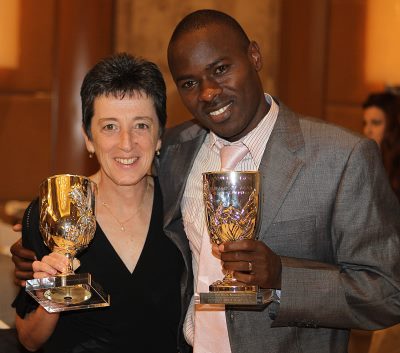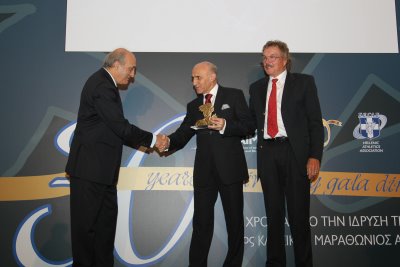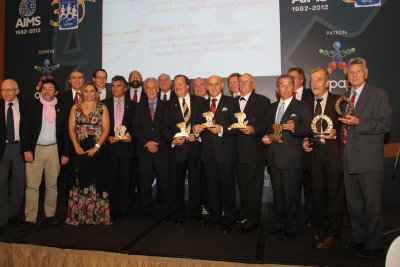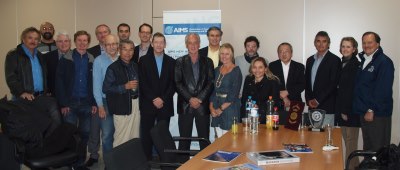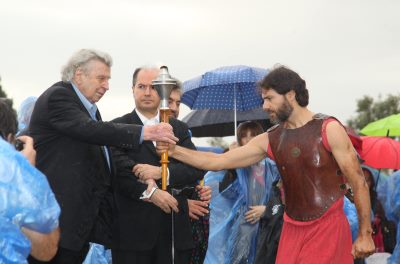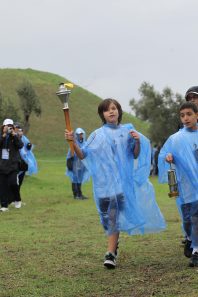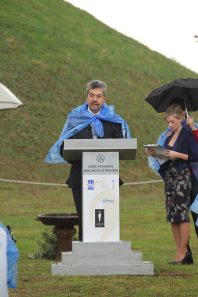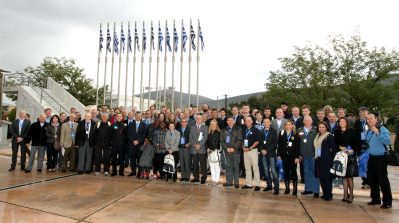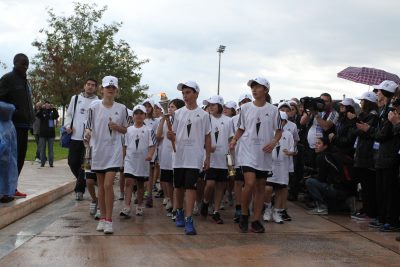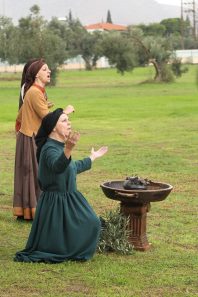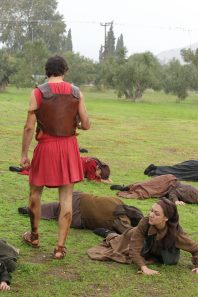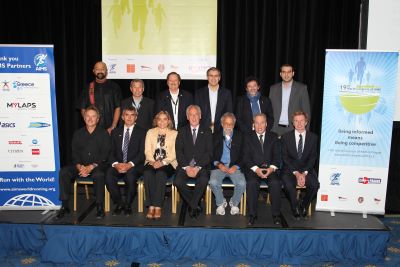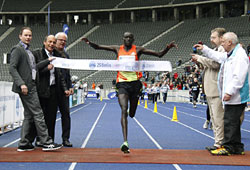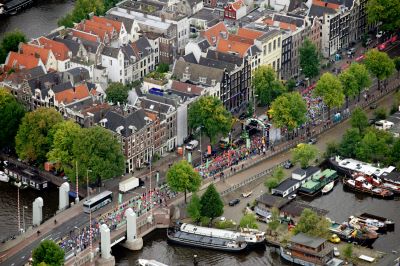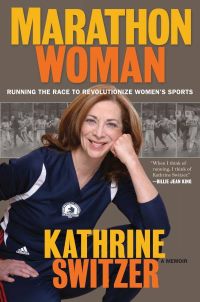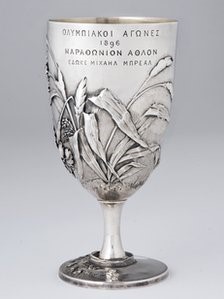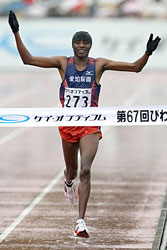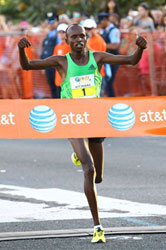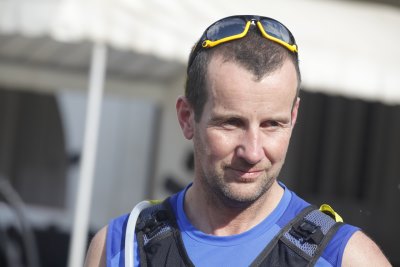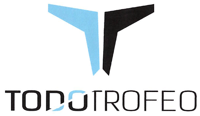 To read the latest & past editions click here
To read the latest & past editions click here
|
|
|||||||||||||||||||||||||||||||||||||||||||||||||||||||||||||||||
|
n 31 December Tsegay Tesfaye and
Priscah Jeptoo won the 57th edition of the Sao
Silvestre de Luanda 10km
(more) on the streets of the
Angolan capital. Tesfaye edged clear over the final 2km
while, although she also won by a 13-second margin,
Jeptoo was never challenged for the lead. In 88th
running of the Sao Silvestre de Sao Paulo
(more)
in Brazil.
In the early hours of 1 January the 9th Neujahrsmarathon Zurich (more) took to the streets of the Swiss financial capital at the stroke of midnight, with Jan Fruc winning the men's race in 2:45:56 and Astrid Mueller knocking 15 minutes from her course record in the women's race with 2:59:29. |
|||||||||||||||||||||||||||||||||||||||||||||||||||||||||||||||||
|
|
|||||||||||||||||||||||||||||||||||||||||||||||||||||||||||||||||
|
|
|||||||||||||||||||||||||||||||||||||||||||||||||||||||||||||||||
|
On 9 December the Nara Marathon
(more) was run in
Japan and the Tsengwen Reservoir Marathon
(more) in
Chinese Taipei. The Quantum Nicosia Marathon
(more) was
held in the Cypriot capital and the Lisbon Marathon
(more)
in Portugal. The Pampulha Lagoon 17.8km
(more) road race
took place in Belo Horizonte, Brazil, the Run
Barbados Half Marathon
(more) in the Caribbean and the
Powerade Monterrey Marathon
(more) in Mexico.
On 7 December the Sharm El Sheikh Half Marathon was held through the Ras Al Mohamed National Park at the southern tip of Siniai. |
|||||||||||||||||||||||||||||||||||||||||||||||||||||||||||||||||
|
|
|||||||||||||||||||||||||||||||||||||||||||||||||||||||||||||||||
|
4 December: The tomb of Michel Breal, who
instigated the modern Marathon by getting it included in
the inaugural modern Olympic programme, has been
restored after the Montparnasse Cemetery authorities in
Paris had threatened to "reclaim" the plot and bulldoze
the damaged grave.
|
|||||||||||||||||||||||||||||||||||||||||||||||||||||||||||||||||
|
|
|||||||||||||||||||||||||||||||||||||||||||||||||||||||||||||||||
| Descendants of Breal appealed to several sources for funds to cover the restoration work but only as the deadline was close to expiry did they approach AIMS for funding. The cost of the repairs was covered jointly by AIMS and IAAF. The funds were made available in June and the work was completed in November. | |||||||||||||||||||||||||||||||||||||||||||||||||||||||||||||||||
|
|
|||||||||||||||||||||||||||||||||||||||||||||||||||||||||||||||||
|
Joseph Gitau won the 66th Fukuoka International Open
Marathon Championship
(more) in Japan on 2 December
in 2:06:58, finishing well ahead of first Japanese
Horoyuki Horibata in second place. Silvester Teimet too
the Toray Cup Shanghai Int'l Marathon
(more), in a time
of 2:09:01. The women's winner, Feyse Tadese, recorded
an impressive 2:23:07. The Macau Galaxy Entertainment
Int'l Marathon
(more) was held further along the South
China Sea coast, while in the Standard Chartered
Singapore Marathon
(more) Kenedy Lilan took victory by a
margin of five seconds over Luke Kibet. The
Angkor-Wat Int'l Half Marathon
(more) was held In Cambodia
and the Pune International Marathon and the
Navi Mumbai Barefoot Marathon in India.
With no AIMS races scheduled in Europe action moved to the Caribbean, with the St. Croix International Marathon (more) in the Virgin Islands and the Intertrust Cayman Islands Marathon (more). On the mainland the 36th Panama Canal Int'l Marathon (more) was run, along with the Costa Rica Int'l Marathon and Half in neighbouring Costa Rica. The Puebla Marathon (more) and the Gran Maraton Pacifico (more) were held in Mexico and the Zappo's.com Rock 'n' Roll Las Vegas Marathon (more) across the border in Nevada, USA. The Ayla Read Sea Int'l Half Marathon (more) was held on 30 November. The Reggae Marathon (more) took place in Negril, Jamaica, on 1 December |
|||||||||||||||||||||||||||||||||||||||||||||||||||||||||||||||||
|
|
|||||||||||||||||||||||||||||||||||||||||||||||||||||||||||||||||
|
The Antarctica Ice Marathon
(more), at 80degS,
was run on
the White Continent on 20 November.
The 12th Pharaonic 100km (more) was run in Egypt on 23 November from the Sakkara Pyramids to El Faioum. The Malta Challenge Marathon (more) ran its three-day programme from then as well with an 11.195km opening leg, with 6km and 25km stages on the following two days. On 25 November there were no less than 14 AIMS events on four continents. The Osaka Marathon (more), Mount Fuji Marathon (more), and the Kobe Marathon (more) were held in Japan; the Beijing Marathon (more) in China, and the Unicef Charity Half Marathon (more) in Hong Kong. In the Jamba Cloud Hyderabad 10km (more) in India Mosinet Gremew edged Nicholas Kipkemboi by a single second, to break a longtime Kenyan stranglehold on the event. Yebrgual Melese put 80m between herself and rising Kenyan star Beatrice Mutai to win the women's race in 33:21. The Commercial Bank of Ethiopia Great Ethiopian Run (more) took place in Addis Ababa. Other events were held throughout the length of the Mediterranean, from the Cyprus Aphrodite Half Marathon (more) to the Firenze Marathon (more), with the Serge Vigot La Rochelle Int'l Marathon (more) and the Marathon Donostia - San Sebastian (more) taking place to the north of the Pyrenees on Atlantic shores. The Quito21k Mitad del Mundo (more) was held in Ecuador. In North America the 21K Nuevo Leon (more) was run in Mexico, and the Amica Insurance Seattle Marathon (more) took place on the west coast of the USA. |
|||||||||||||||||||||||||||||||||||||||||||||||||||||||||||||||||
|
|
|||||||||||||||||||||||||||||||||||||||||||||||||||||||||||||||||
|
On 18 November the Yokohama Women's Marathon
(more)
was run for the fourth time in Japan. In China the
Hangzhou International Marathon took place, while
the Penang Bridge International Marathon
(more)
was held
in Malaysia and the Standard Chartered Bangkok
Marathon
(more)
in Thailand.
In Europe the 26th Turin Marathon (more) was held in Italy and the 32nd Divina Pastora Valencia Marathon (more) in Spain. The Marabana Marathon (more) was run in the Cuban capital, La Habana. In the United States the Philadelphia Marathon (more) celebrated its 19th edition and the Big Sur Half Marathon on Monterey Bay (more) in California presented its 10th running. |
|||||||||||||||||||||||||||||||||||||||||||||||||||||||||||||||||
|
|
|||||||||||||||||||||||||||||||||||||||||||||||||||||||||||||||||
|
16 November: A television programme on the
Antarctic Ice Marathon has been nominated for an
International Emmy Award. The Gala takes place in New
York on 19 November - the day race director Richard
Donovan travels to Antarctica for this year's event. The
programme is called 'Planeto Extremo' and was produced
and broadcast by TV Globo. Although there were several
different one-hour programmes in the Planeto Exremo
series, it is the Ice Marathon that has been nominated.
The category is 'non-scripted entertainment' and it is
one of four final nominees.
|
|||||||||||||||||||||||||||||||||||||||||||||||||||||||||||||||||
|
|
|||||||||||||||||||||||||||||||||||||||||||||||||||||||||||||||||
|
On 11 November the Blom Beirut Marathon
(more)
10th anniversary edition was won by Ethiopians Kedir
Fekadu (2:12:57 and Saeda Kedir (2:35:08)
The 34th edition of the Vodafone Istanbul Eurasia Marathon (more) crossed the Bosphorus Bridge from the Asian to the European side. In the 30th anniversary Athens Classic Marathon (more) Raymond Bett shaved five seconds from the event record, although he was 40 seconds slower than Stefano Baldini's course record set in the 2004 Olympic Games Marathon. Consolater Yadaa won the women's race, her first at the distance, in 2:40:00 The Guarda Trentino Half Marathon (more) was held in the north of Italy and in Brazil the 10km Rio Pan-American Race (more) took place in Rio de Janeiro. |
|||||||||||||||||||||||||||||||||||||||||||||||||||||||||||||||||
|
|
|||||||||||||||||||||||||||||||||||||||||||||||||||||||||||||||||
|
10 November: Marathon world record holder Patrick Makau of Kenya and 1988 Olympic Marathon Champion Rosa Mota of Portugal were honoured at the AIMS-Athens Classic Marathon 30th Anniversary Gala Dinner on 9 November in a ceremony broadcast live on Greek national television. The joint celebration was presented by the Patron of AIMS and major sponsor of ACM, OPAP s.a., the leading gaming operator in Greece. |
|||||||||||||||||||||||||||||||||||||||||||||||||||||||||||||||||
|
|
|||||||||||||||||||||||||||||||||||||||||||||||||||||||||||||||||
| Mota and Makau were presented with larger-than-life sized replicas of the silver cup received by Spyros Louis, the winner of the inaugural 1896 Athens Olympic Marathon. The original cup, donated by renowned French philologist Michel Breal, stands only 15cm high. In April this year it fetched a price at auction of $878,000, but was secured by the Stavros Niarchos Foundation and is displayed at the Acropolis Museum, only a few hundred metres away from where Makau and Mota received their enlarged replicas. | |||||||||||||||||||||||||||||||||||||||||||||||||||||||||||||||||
|
|
|||||||||||||||||||||||||||||||||||||||||||||||||||||||||||||||||
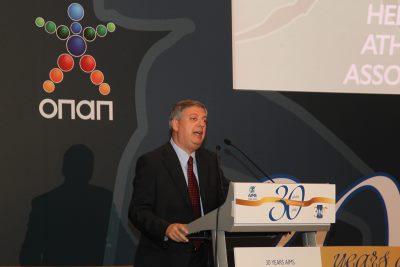 |
|||||||||||||||||||||||||||||||||||||||||||||||||||||||||||||||||
| Makau, who set his world record 2:03:38 in Berlin in 2011, said, “It’s an honour for me to come and receive this award at the birthplace of the Olympic Games and the birthplace of the marathon”. Mota won the first women's international championship marathon ever held when she took the inaugural European title in Athens in 1982. She went on to become bronze medalist in the Los Angeles Olympics in 1984 before triumphing in Seoul in 1988. “The Olympics began here, the marathon began here, and my career as a marathon runner began here” she said. | |||||||||||||||||||||||||||||||||||||||||||||||||||||||||||||||||
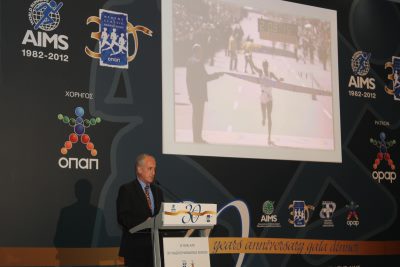 |
|||||||||||||||||||||||||||||||||||||||||||||||||||||||||||||||||
|
|
|||||||||||||||||||||||||||||||||||||||||||||||||||||||||||||||||
|
|||||||||||||||||||||||||||||||||||||||||||||||||||||||||||||||||
| Jean Francois Delasalle received an award as the longest-serving course measurement administrator (since 1993), and the oldest Marathons on each continent were presented with gilded laurel wreaths for their leading role in popularising the Marathon as a global event. These were (alphabetical by Continent): Africa: Comrades Marathon (1921); Americas: Boston Marathon (1897); Asia: Fukuoka Marathon (1947); Europe: Kosice Marathon (1924); and Oceania: Rotorua Marathon (1965). | |||||||||||||||||||||||||||||||||||||||||||||||||||||||||||||||||
|
AIMS & friends at
the Athens Headquarters before the 30th Anniversary Gala |
|||||||||||||||||||||||||||||||||||||||||||||||||||||||||||||||||
|
|
|||||||||||||||||||||||||||||||||||||||||||||||||||||||||||||||||
|
10 November: The 6th AIMS Marathon Symposium was
preceded by ceremonies at the Tomb of the Marathon
Warriors, 5km from the start line of the Athens Classic
Marathon, The Marathon flame was lit there, in the
presence of the celebrated Greek composer Mikis
Theodorakis, after formal addresses and a dramatised
prelude. Rain fell steadily throughout proceedings but
failed to extinguish the spirit as the flame was
entrusted to a relay of children who carried it to the
Marathon startline.
|
|||||||||||||||||||||||||||||||||||||||||||||||||||||||||||||||||
|
|
|||||||||||||||||||||||||||||||||||||||||||||||||||||||||||||||||
| Awaiting them there were Patrick Makau and Rosa Mota (along with Makau's young daughter who had earlier borne the rain with marathon-like fortitude). They received the torch along with the great-grandson of the inaugural Olympic Marathon Champion Spyros Louis, and together lit the cauldron positioned on a rostrum by Marathon Bridge, next to the starting line used for the 2004 Olympic Marathon. | |||||||||||||||||||||||||||||||||||||||||||||||||||||||||||||||||
|
|||||||||||||||||||||||||||||||||||||||||||||||||||||||||||||||||
| In the afternoon the Symposium addressed the question how to deliver quality in a Marathon and add value to a runner's experience. Fernando Jamarne, of Santiago Marathon, showed how basic requirements could be met simply by observing published rules and advice. Mark Milde addressed the registration process, which for the 40th Berlin Marathon to be run on 29 September 2013 had taken place only two weeks' earlier. Milde had helped to guide successful registration of 32,000 runners in 3.5 hours - but the first 10,000 registrations had come within two minutes. He revealed that advice had been received that 4000 people were electronically queuing up to register in the very first second after opening. That this volume of traffic was successfully fielded was down to Milde thinking himself into the position of the runners, and asking for minimum inputs at such a peak time. A second stage followed in which runners who had 'logged interest' were contacted to supply further details and a payment to secure their "pre-booked" place. | |||||||||||||||||||||||||||||||||||||||||||||||||||||||||||||||||
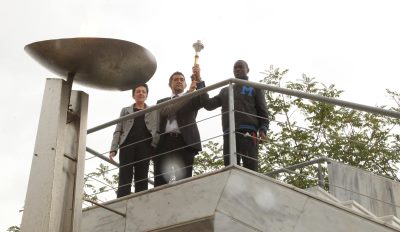 |
|||||||||||||||||||||||||||||||||||||||||||||||||||||||||||||||||
|
|
|||||||||||||||||||||||||||||||||||||||||||||||||||||||||||||||||
| Inna Chernoblavskaya, from the Siberian International Marathon followed the theme of putting herself in the shoes of her client runners - almost literally, but in reverse. The Siberian Ice Half Marathon on 7 January each year has been held in temperatures as low a -42C (2001) but the organisation knows what is necessary to meet such adverse conditons: accessorising runners with appropriate thermal clothing and keeping them closely watched at all times during the race (on a 3.5km circuit). Underlying all these contributions was the advice to listen to how runners experienced the race and absorb the implications of such feed back to add value to future events. | |||||||||||||||||||||||||||||||||||||||||||||||||||||||||||||||||
|
|
|||||||||||||||||||||||||||||||||||||||||||||||||||||||||||||||||
| Gary Boshoff argued that the running experience is broader than the runner's experience, because it encompasses spectators and supporters, who in an event like the (89km) Comrades Marathon have lived through months of race preparation along with the runner. Measures to integrate all parties may be orientated to either of them: on-course entertainment for supporters rubs off onto runners as much as public recognition of regular repeat runners (a "green jersey" for runners who have completed 10 times) rubs off on their supporters. | |||||||||||||||||||||||||||||||||||||||||||||||||||||||||||||||||
|
|||||||||||||||||||||||||||||||||||||||||||||||||||||||||||||||||
| To conclude, Dimitris Gargalianos, Professor of Physical Education at the Democritos University of Thrace, delivered a challenging address on the principles of "Total Quality Management". None of the 50 race directors in the audience was prepared to claim that they applied "total quality management" - although Gargalianos at the outset had reversed the order of importance to management, quality and "total". He went on to suggest that just by appointing one suitable person to apply the concept, and taking the appointment seriously, much could be achieved. He advocated closer co-operation between race organisations and academic institutions, who both stand to gain from a closer association, if they can develop an effective way to engage. | |||||||||||||||||||||||||||||||||||||||||||||||||||||||||||||||||
|
|
|||||||||||||||||||||||||||||||||||||||||||||||||||||||||||||||||
|
The ninth edition of the Sharm El Sheik Half
Marathon has been postponed to 7 December. |
|||||||||||||||||||||||||||||||||||||||||||||||||||||||||||||||||
|
|
|||||||||||||||||||||||||||||||||||||||||||||||||||||||||||||||||
|
On 28 October the adidas Auckland Marathon
(more)
incorporated the New Zealand championships. The
Dong-A Ilbo Chunchon Marathon
(more)
celebrated its 63rd edition in Korea. The Standard
Chartered Nairobi Marathon
(more)
was held for the 10th time in the Kenyan capital.
World record holder Patrick Makau won the BMW Frankfurt Marathon (more) in Germany's financial capital in the comparatively slow time of 2:06:08. Marathon debutante Meselech Melkamu broke the course record with 2:21:01 The 9th Porto Marathon (more) was held in Portugal's second city in strong winds, won by Anthony Wairuri in 2:12:14 and Abeba Teklu Gebremeskel in 2:39:51. Elsewhere in Europe the Podgorica Marathon (more) in Montenegro was held for the 19th time, While the Ljubljanski Maraton (more) celebrated its 17th edition. The Venice Marathon (more) welcomed a capacity entry of 8000 runners. Just to the north two Marathons were held in Switzerland: the Lausanne Marathon (more) and the Lucerne Marathon (more). Across the Atlantic the Marine Corps Marathon (more) was staged for the 37th time in the US capital, and the UWI-SPEC Half Marathon (more) was run from the University of the West Indies' Trinidad campus just outside Port-of-Spain. The National Lottery Dublin Marathon (more) was held on 29 October - a public holiday in Ireland. |
|||||||||||||||||||||||||||||||||||||||||||||||||||||||||||||||||
|
|
|||||||||||||||||||||||||||||||||||||||||||||||||||||||||||||||||
|
25 October: Online registration for the BMW
Berlin Marathon, due to take place on 29 September
2013, was launched by the Mayor of Berlin, Klaus
Wowereit at the Berlin City Hall. Last year the
participant limit of 40,000 was reached within six
weeks.
The new partnership covers the marketing of sponsorship packages and the distribution of the worldwide media rights for the BMW Berlin Marathon. It is also intended that the Infront subsidiary Host Broadcast Services (HBS) will carry out the media production from 2013 onwards, in order to offer broadcast partners around the world a first-class TV signal and attractive formats. Successful projects undertaken by the company include the production of top sports events such as the FIFA World Cup™, the Asian Games, the French Football League and the triathlon-series Ironman. The event also marked the start of a new partnership between Marathon organisers SCC Events and Infront Sports & Media, an industry leader. Infront markets the matches of the German national football team and several Bundesliga clubs alongside high-profile World Cup events in winter sport. SCC Events CEO Christian Jost said: “In 2010, we took television production into our own hands to ensure live broadcast coverage. From the cooperation with Infront, we expect highly professional support for our marketing efforts, which will further develop the BMW Berlin Marathon.” Günter Netzer, Executive Director at Infront, adds: “Berlin is among the most prestigious of international city marathons and we are pleased to contribute in all areas of marketing and media exploitation. The aim is to further increase the appeal of this extremely popular event for fans and commercial partners. This partnership is a strategic step for Infront to extend our portfolio in the growth segment of mass-participation events for media and sponsors.” Berlin's Mayor Klaus Wowereit added: “The Marathon is one of the most prestigious sports events in the German capital. Cooperating with an international sports marketing company is going to make the Berlin Marathon even more a of flagship for the city of Berlin.”
UPDATE: |
|||||||||||||||||||||||||||||||||||||||||||||||||||||||||||||||||
|
|
|||||||||||||||||||||||||||||||||||||||||||||||||||||||||||||||||
|
On 21 October the Dong-A Ilbo Gyeongju Int'l
Marathon
(more)
took place in Korea.
In Europe at the TCS Amsterdam Marathon (more) in the Netherlands the new World Half Marathon champion Meseret Hailu broke the course record with 2:21:09, and Wilson Chebet shaved three seconds off the men's record with 2:05:41. The Lago Maggiore Marathon (more) was held in the Italian Lakes region, the Semi Marathon de Saint-Denis - La Voie Royale (more) just to the north of Paris, and the Marato del Mediterraneo (more) just outside Barcelona. In the Medio Maraton Valencia Trinidad Alfonso (more) in Spain's third city Joel Kemboi Kimurer failed by just six seconds to break the course record, and was only 10 seconds outside the Spanish all-comers record. The Grand Marathon International de Casablanca (more) took place in Morocco and the Niagara Falls International Marathon (more) started in Buffalo, New York state, crossing the border to finish alongside the Falls on the Canadian side. On 19 October the Amman International Marathon (more) was held in the capital of Jordan. |
|||||||||||||||||||||||||||||||||||||||||||||||||||||||||||||||||
|
|
|||||||||||||||||||||||||||||||||||||||||||||||||||||||||||||||||
|
On 14 October the medibank Melbourne Marathon
(more)
in Australia celebrated its 35th edition.
The Beijing Marathon, scheduled for 14 October is, according to the China International Travel Service, "prone to delay" (read more). In Europe the 13th Poznan Marathon (more) took place in Poland and the 20th Novi Sad Marathon (more) in Serbia's second city. In the north of Italy the Maratona d'Italia (more) celebrated its silver Jubilee. Across the Alps the Munich Marathon (more) this year incorporated the German Championships. Further north the Rhein Energie Marathon Koln (more) also took place in Germany, with Alfred Kering and Helena Kiprop winning in 2:07:37 and 2:25:34. The men's performance of the day came in the De Lage Landen Eindhoven Marathon (more) in the Netherlands, where Dickson Chumba ran 2:05:46, and six others went sub-2:09. Aberume Merkuria won the women's race in 2:27:20 and Miranda Boonstra took the Dutch title less than a minute behind her. Across the Atlantic the Scotiabank Toronto Waterfront Marathon (more) was held in Canada's largest and most cosmopolitan metropolis, with wins for Betona Warga (2:10:36) and New Zealand's Mary Davies (2:28:57). |
|||||||||||||||||||||||||||||||||||||||||||||||||||||||||||||||||
|
|
|||||||||||||||||||||||||||||||||||||||||||||||||||||||||||||||||
|
At the IAAF World Half Marathon
Championships
(more)
in Kavarna, Bulgaria, on 6 October Zersenay
Tadese took an emphatic 32-second victory to win the
title for the 5th time. Meseret Hailu was a surprise
winner of the women's race, leading Ethiopia to the team
title.
7 October was the most crowded day of the year so
far with 15 AIMS Races scheduled. The 12th Colombo
Marathon
(more) started the programme in Sri Lanka, followed
by seven races in Europe: The Raiffeisen Bank
Bucharest Marathon
(more) in Romania, the IX Bila
Tserkva Marathon
(more) in Ukraine, Europe's oldest
marathon the 89th Kosice Peace Marathon
(more) in
Slovakia, the 27th Spar Budapest Int'l Marathon
(more)
in Hungary, the Zagreb Marathon
(more) in Croatia, the
Sparkasse 3-Country Marathon
(more) starting in Germany
and finishing in Austria after passing touching Swiss
Territory, and the Brussels Marathon
(more) in Belgium. |
|||||||||||||||||||||||||||||||||||||||||||||||||||||||||||||||||
|
|
|||||||||||||||||||||||||||||||||||||||||||||||||||||||||||||||||
|
This year marks the 30th anniversary of AIMS, the
Association having been "established" at a meeting on
6-7 May 1982. Coinciding with AIMS, the Athens Classic
Marathon (ACM) also celebrates its 30th anniversary.
AIMS & SEGAS (the Hellenic Athletics Association organizer of ACM) together will honor their common 30th anniversary through a special event, a Gala-Dinner to take place in Athens, the birthplace of Marathon, the location of the new AIMS headquarters and the site of the authentic marathon, the Athens Classic Marathon. The joint celebration of AIMS & ACM will be presented by the Patron of AIMS and major sponsor of ACM, OPAP s.a., the leading gaming operator in Greece. AIMS & SEGAS on behalf of ACM will honor all those who have contributed towards making our running movement into such a successful mass sporting community in front of the Greek political and sport leaders, the Boards of AIMS & SEGAS, more than 50 race directors from all continents and a number of sporting and social figureheads from Greece and abroad. During the Gala-Dinner which will be held in the historic center of Athens, on the evening of 9 November 2012, AIMS & ACM will honor Patrick Makau, the World Marathon Record Holder, Rosa Mota, the Olympic Medalist of the 1988 Olympic Games in Seoul, Nikos Pollias, the Greek Marathon Record holder, Georgia Abatzidou, the Greek female multi winner of ACM, Hiroaki Chosa, founding member and former President of AIMS, Lamine Diack, President of IAAF (tbc) and the organizers of the oldest Marathons on each continent. AIMS and SEGAS are pleased to encourage the runners of the world to be in Athens for this unique 30th Anniversary of the Athens Classic Marathon. To register for the ACM a runner needs to visit www.athensclassicmarathon.gr. The same website can also be used for media accreditation. |
|||||||||||||||||||||||||||||||||||||||||||||||||||||||||||||||||
|
|
|||||||||||||||||||||||||||||||||||||||||||||||||||||||||||||||||
|
Autumn racing really got into its stride on 30
September with a full programme starting with the
ultra-competitive Airtel Delhi Half Marathon
(more)
in
the Indian Capital. Hot conditions restricted winning
times to 1:00:55 by Edwin Kipyego and 1:11:10 by Yimer
Wude.
In the BMW Berlin Marathon (more) race favourite Geoffrey Mutai worked hard to post the year's leading time, 2:04:15, beating his training partner and marathon debutant Denis Kimetto by a single second while Aberu Kebede won the women's race in 2:20:30. The Singelloop Utrecht 10km (more) in Holland was won by Charles Cheruiyot in 28:22 and Miranda Boonstra in 34:05, the BIL Route du Vin Half Marathon (more) in Luxemburg by Robert Mengich in 1:00:48 and Farida Chelegat in 1:10:36, and the Vodafone Half Marathon RTP Rock 'n' Roll Portugal (more) by Martin Lel in 1:01:28 and Priscah Jeptoo in 1:10:36. In UK the Baxters Loch Ness Marathon (more) was run in the north of Scotland and the Bristol Half Marathon (more) in the west of the country. Across the Atlantic the 10km San Jose in Costa Rica was cancelled. The Lake Tahoe Marathon (more) - the closing event in a three-day running festival - took place in California. |
|||||||||||||||||||||||||||||||||||||||||||||||||||||||||||||||||
|
|
|||||||||||||||||||||||||||||||||||||||||||||||||||||||||||||||||
|
On 22 September the Fokus Bank Oslo Marathon
was run on a two-lap course through the Norwegian
capital.
The Camsur Marathon, scheduled for 23 September, did not take place this year. The Hyderabad Heritage Marathon (more) was held in capital of the Indian state of Andra Pradesh, and the Cape Town Marathon (more) in South Africa. Action then continued in Europe, with the Varadzinski Half Marathon (more) in Croatia, the Citta di Udine Half Marathon (more) just over the border in North-East Italy, the 30th edition of the Turin Half Marathon (more), the Dam tot Damloop (more) race in Amsterdam over the distance of 10 English miles, the Hans Christian Andersen Marathon (more) in Odense, Denmark and the Charleville Half Marathon (more) in Ireland. The day's programme closed with the Gatorade Caracas Rock 10km in the Venezuelan capital. |
|||||||||||||||||||||||||||||||||||||||||||||||||||||||||||||||||
|
|
|||||||||||||||||||||||||||||||||||||||||||||||||||||||||||||||||
21 September: AIMS, in collaboration with the City of
Marathon and SEGAS (the Hellenic Athletics Association), has
established the annual international “AIMS Marathon
Symposium”. It is held at the historic start venue of
the Athens Classic Marathon, in the Marathon Municipality,
the day before the race is held.
The Symposium aims to encourage closer co-operation and exchange of views on issues of mutual interest to assist organizers in improving their races. The organization of an annual Symposium at the birthplace of the Marathon, besides discussing current issues regarding the organization of a successful Marathon event, also raises significant symbolism related to World Peace, Olympic Ideals and Fair Play. Specifically, the theme of 6th AIMS Marathon Symposium to be held on 10 November 2012, is: “Levels & Quality Control of a Marathon Event”. During the Symposium four major speakers and other round table participants will present and discuss with the audience various issues related to the main topic, aiming to offer ideas, solutions and practices to race organizers and city or sport authorities involved. The full list of speakers’ names will be announced at the end of September. For further information visit the Symposium page of the AIMS website (here) |
|||||||||||||||||||||||||||||||||||||||||||||||||||||||||||||||||
|
|
|||||||||||||||||||||||||||||||||||||||||||||||||||||||||||||||||
AIMS WITH POLE POSITION
21 September: A sponsorship agreement was signed at AIMS Headquarters in Athens with Pole Position, covering the period September 2012-2016. AIMS President Paco Borao said “we welcome Pole Position to the AIMS Family and are sure that a mutually beneficial relationship will be developed with a company able to offer such useful products and services to our 340 members spread throughout the World”. Pole Position General Manager Horst Meissner said “we are extremely happy to become a Supporting Partner of AIMS and believe that this will open new markets for our company, and allow us to contribute to the success of AIMS member Marathons.” Pole Position specializes in the design and production of goods supporting Marathons and Triathlons, since 2003 producing textiles and sports accessories from its own facility in south-east China. The company also offers the development and design of innovative products in sportswear, running, cycling, water sports, events and merchandising. For more information visit: http://www.poleposition.ag/ or contact Fabian Meissner at fm@poleposition.ag |
|||||||||||||||||||||||||||||||||||||||||||||||||||||||||||||||||
|
|
|||||||||||||||||||||||||||||||||||||||||||||||||||||||||||||||||
|
On 15 September the DN Stockholm Half Marathon
(more)
was run through the Swedish capital, and the African
University Peace Marathon took place in Zimbabwe's
third city, Mutare.
On 16 September the programme opened with the Marathon of Blackmore's Sydney Running Festival (more) in Australia followed by a clutch of races in Central Europe: the Timisoara Marathon (more) in Romania, the 30th anniversary Hasco-Lek Wroclaw Marathon (more), the VW Usti Half Marathon (more) in the Czech Republic and the Wachau Marathon (more) in Austria. Finally the Sport Zone Half Marathon (more) took place in Porto, northern Portugal. |
|||||||||||||||||||||||||||||||||||||||||||||||||||||||||||||||||
|
|
|||||||||||||||||||||||||||||||||||||||||||||||||||||||||||||||||
 |
|||||||||||||||||||||||||||||||||||||||||||||||||||||||||||||||||
AIMS 30th ANNIVERSARY
13 Sept: This year marks the 30th anniversary of AIMS, the Association having been "established" at a meeting on 6-7 May 1982. Coinciding with AIMS, the Athens Classic Marathon also celebrates its 30th anniversary at the time of the 6th AIMS Marathon Symposium, to be held in Athens on 10 November. |
|||||||||||||||||||||||||||||||||||||||||||||||||||||||||||||||||
|
|||||||||||||||||||||||||||||||||||||||||||||||||||||||||||||||||
| AIMS & SEGAS together will honour, through this special event, all those who have contributed towards making our running movement into such a successful mass sporting community. Among them will be athletes, social and sporting authorities, organisers, sponsors, IAAF – as the governing body for athletics - and AIMS through its founding members and current membership of 340 races worldwide in 97 countries and territories. | |||||||||||||||||||||||||||||||||||||||||||||||||||||||||||||||||
|
|
|||||||||||||||||||||||||||||||||||||||||||||||||||||||||||||||||
|
On 8 September the Novosibirsk Half Marathon
(more)
took place in the capital of Siberia. In Europe the
Jungfrau Marathon
(more)
was held, and the Mattoni Grand
Prix Metro 10km
(more)
is run on the streets of Prague as
the sun sets.
On 9 September most of the action took place in Europe, with the Moscow Peace Marathon (more), the Vilnius Marathon (more) in Lithuania, the SEB Tallinn Marathon (more) in Estonia, the Running Festival of the Economic Forum and the Pila Int'l Half Marathon (more) in Poland, the Nike Budapest Half Marathon (more) in Hungary, the Volksbank Munster Marathon (more) in Germany and the Powerade Kobenhavn Halvmaraton (more) in Denmark. The Medellin Flower Marathon (more) was staged in Colombia. |
|||||||||||||||||||||||||||||||||||||||||||||||||||||||||||||||||
|
|
|||||||||||||||||||||||||||||||||||||||||||||||||||||||||||||||||
7 September 2012: Kenyan athlete
Patrick Makau has been awarded the AIMS World’s Fastest Time
Award in recognition of his World Record breaking time of
2:03:38 set in the 38th BMW Berlin Marathon, on 25
September 2011.
|
|||||||||||||||||||||||||||||||||||||||||||||||||||||||||||||||||
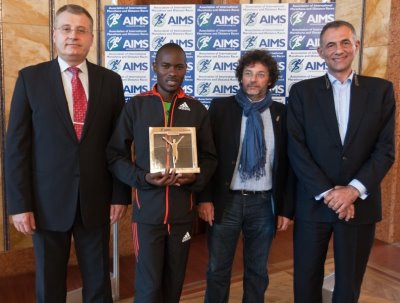 |
|||||||||||||||||||||||||||||||||||||||||||||||||||||||||||||||||
| Makau’s
great achievement was given global recognition at a presentation at
the Mayor’s Residence in Prague. Makau was presented with his award
by City of Prague Representative Jiri Nouza, AIMS Board Member Bruno
Boukobza and President of the Organizing Committee for the Prague
International Marathon, Carlo Capalbo. On 8 September he will
compete in the Metro 10km Race within the frame of the Mattoni Grand
Prix. Makau (27) broke the world record at the BMW Berlin Marathon on 25 September 2011. Competing against the then world record holder Haile Gebrselassie, Makau won the race and in doing so set a new world record 21 seconds faster than Gebrselassie's time set in the Berlin Marathon in 2008. |
|||||||||||||||||||||||||||||||||||||||||||||||||||||||||||||||||
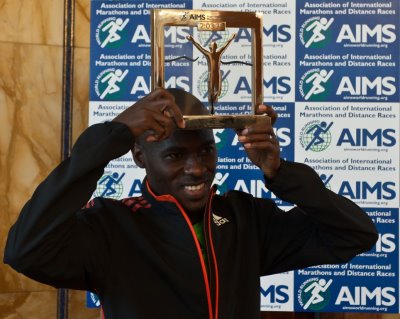 |
|||||||||||||||||||||||||||||||||||||||||||||||||||||||||||||||||
| AIMS have
been awarding the AIMS World’s Fastest Time Award (more) to male and
female athletes in recognition of world record breaking performances
since 1988. Makau is the 18th recipient of the AIMS World’s Fastest
Time Award. It is the second award that he has received from AIMS -
his outstanding performances in 2010 were recognised with the AIMS
World Athlete of the Year Award. Patrick Makau comments: “I would like to thank AIMS for this extremely illustrious award. It is a great honour to look at the list of previous winners and to see my name listed alongside them.” |
|||||||||||||||||||||||||||||||||||||||||||||||||||||||||||||||||
|
|
|||||||||||||||||||||||||||||||||||||||||||||||||||||||||||||||||
|
On 1 September the 29th Ruskamarathon
(more)
took place in Kiitila, Finnish lapland.
On 2 September the 4th edition of the Fjord Norway Half Marathon (more) was held in Knarvik, along with the 30th edition of the Knarvikmila 10km in which Haile Gebreselassie guests. Westward from there the Torshavn Marathon (more) was run in the Faroe Islands, while the Great Scottish Run Half Marathon (more) took place in Glasgow. Across the Atlantic the Maraton de la Ciudad de Mexico (more) celebrated its 30th edition, while the 22nd edition of the Medio Maraton Atlas (more) was held in Mexico's second city of Guadalajara. Rounding off the day's action the Kauai Marathon (more) was run in the Hawaiian Islands. |
|||||||||||||||||||||||||||||||||||||||||||||||||||||||||||||||||
|
|
|||||||||||||||||||||||||||||||||||||||||||||||||||||||||||||||||
28 August: The International Marathon of Mexico City
celebrates its 30th anniversary edition on 2 September
writes Anatol Alvarez Ibarra. It is one of the most
established marathons of South America, and this year 20,000
runners are expected to take part over all events – half of
them in the Marathon itself. The race now heralds an iconic
day for the people of Mexico City. The first edition took
place in 1983 attracting 2000 runners – but by the very next
year numbers were already up to 10,000.
The first Marathon featured the participation of the Tarahumara Indians, running for the first time in an international Marathon. Tarahumara, or Raramuri as they call themselves, are native Indians of Chihuahua state in the north of Mexico. In Tarahumara dialect the world Raramuri comes from the roots rara (foot) and muri (run), and means foot-runners. The Taraumara have an ancient running tradition, moving from one place to another to attend traditional festivities by running very long distances. When one of the Raramuri runners got to the Marathon finish line he kept on running to complete another 42km – and all this at 2200m altitude. In the 1984 Marathon, the Raramuri made their own leather sandals to wear during the competition. The race started within the Autodromo Hermanos Rodríguez located near to the Airport and finished at the central park downtown. Among the top Mexican runners, was Rodolfo Gómez, who had placed highly in the Tokyo, New York, London and Athens Marathons, and he went on to win the Mexico City International Marathon. The race is organized by the Institute of Sport, which has made improvements year by year to make the Marathon among the foremost in the world. This year the XXXth edition will be the biggest yet, including a concert in the Zócalo of Mexico City and a variety of incentives and surprises for the runners. 2012 is the last year of Mexico City’s Governor Marcelo Ebrard’s administration, so celebrating in style was necessity. “We want this edition to be the most memorable in history; to achieve this we have strengthened both the local and the international entries”, said the Institute of Sport’s director, Francisco Javier López Ortíz. Prize money has been increased and bonuses for a course record upgraded (2:12:11 for men and 2:38:24 for women). The mass runners will be recorded at points along the course and official certificates offered along with a special commemorative medal and T-shirt. The start and finish will be at 20th November street and the Zócalo (central square) by City Hall, the course will pass by all the most emblematic and historic sights of the city |
|||||||||||||||||||||||||||||||||||||||||||||||||||||||||||||||||
|
|
|||||||||||||||||||||||||||||||||||||||||||||||||||||||||||||||||
|
On 26 August five AIMS Marathons were held on five
different continents.
The Hokkaido Marathon (more) was run on Japan's northernmost island; the Victoria Falls Marathon (more) was run in Zimbabwe but includes a short section in Zambia; the Longford Marathon (more) took place in Ireland; the SSQ Quebec Marathon (more) was run in Canada; and the Maraton Internacional de Asuncion (more) was held in the Paraguayan capital. |
|||||||||||||||||||||||||||||||||||||||||||||||||||||||||||||||||
|
|
|||||||||||||||||||||||||||||||||||||||||||||||||||||||||||||||||
|
On 18 August the Helsinki City Marathon
(more)
took place in Finland's capital while the Rekjavik
Marathon
(more)
was run in Iceland. In a rare evening event
the Ruta de las Iglesias 10km
(more)
made a tour of the
historical churches in the Ecuadorean capital, Quito.
Action remained west of the Atlantic on 19 August with the Rio de Janeiro International Half Marathon (more) and the Canadian Derby Edmonton Marathon (more). |
|||||||||||||||||||||||||||||||||||||||||||||||||||||||||||||||||
|
|
|||||||||||||||||||||||||||||||||||||||||||||||||||||||||||||||||
|
In the Men's Marathon of the Games of the XXX
Olympiad
(read more)
held in London on 12 August Steven Kiprotich won
Uganda's first gold medal since John Aki-Bu7a's triumph
in the 400m Hurdles in Munich in 1972. He recorded
2:08:01, surging into the lead past the more favoured
Kenyans two-time World Champion Abel Kirui (2:08:27) and
2:04 performer Wilson Kipsang (2:09:37) on the final
13km lap as everyone (including him) was generally
slowing due to the warm and humid conditions.
On the same day, at the same time, the Siberian International Marathon (more) took place in Omsk, Russia. |
|||||||||||||||||||||||||||||||||||||||||||||||||||||||||||||||||
|
|
|||||||||||||||||||||||||||||||||||||||||||||||||||||||||||||||||
On 5 August Tiki Gelana of Ethiopia won the
Women's Marathon of the Games of the XXX Olympiad
(read more)
in London. Following the tail end of a downpour, the
first half was run relatively slowly (1:13:13). Gelana had
fallen in the rain-soaked streets but was able to quickly
regain her position within the large leading group. As the
pace and the weather warmed up during the second half Gelana
was part of a group of six which gradually reduced to four
by 35km, also including Mary Keitany, Priscah Jeptoo and
Tatiana Petrova. Gelana pressed hard after 38km and finally
dropped Keitany with 1200m to run. The others were also left
in her wake as she powered past Buckingham Palace and up the
400m finishing straight on The Mall to set a new Olympic
record of 2:23:07.
|
|||||||||||||||||||||||||||||||||||||||||||||||||||||||||||||||||
|
|
|||||||||||||||||||||||||||||||||||||||||||||||||||||||||||||||||
|
On 28 July the Australian Outback Marathon
(more)
took place in the heart of the continent, with Uluru
(Ayers Rock) as backdrop. On the other side of the
world, contrasting but equally impressive scenery
provided the setting for the Swiss Alpine Marathon
Davos
(more).
On 29 July it was back to Australia for the Westlink M7 Cities Marathon (more), followed by the Milo Marathon Manila Elimination Race (more) in the Philippine capital. Action then moved through 200 degrees of longitude and more to the Media Maraton Internacional de Bogota (more) and the Wipro San Francisco Marathon (more). |
|||||||||||||||||||||||||||||||||||||||||||||||||||||||||||||||||
|
|
|||||||||||||||||||||||||||||||||||||||||||||||||||||||||||||||||
26 July: Since the 9th World Congress of AIMS held in
Macau in 1994, the Berlin Sports Museum has incorporated the
"AIMS Marathon Museum of Running". The Congress named the
Berlin Sports Museum as a repository to which races from all
around the world were urged to send their materials to be
stored and documented.
AIMS also supports the museum financially helping to make it a centre of excellence for the sport of running. There is nothing like it anywhere else in the world. In the last week packages arrived at the museum from the Tokyo Marathon and the Athens Classic Marathon. The Tokyo Marathon has developed over the past five years from a purely elite event with a few hundred runners to an event with about 40,000 participants (and 280,000 applications). The Athens Classic Marathon also made a great leap ahead with the 2,500-year anniversary of the Battle of Marathon in 2010 drawing attention to the race, and attracting record numbers since. Tokyo Marathon race director Tad Hayano recently visited the museum and was amazed at the volume of documents from Japan. He was especially interested in the exhibition case displaying several objects from Japanese female Olympic Champion Naoko Takahashi, who ran a world record of 2:19:46 at the Berlin Marathon on 30 September 2001. The AIMS Marathon Museum is now also well known in Japan, as RUNNET, the largest running magazine in Japan with a monthly circulation of over 270,000, recently carried an article about the museum. The jacket worn by the president of the Tokyo Marathon and former President of AIMS Hiroaki Chosa for the starting shot of the Tokyo Marathon also astounded Hayano. It was one of three such customised jackets created by the main sponsor ASICS. The two others who received them were the Mayor of Tokyo and the President of ASICS. Chosa sent his to the museum shortly thereafter on the request of Museum supporter Horst Milde - a wonderful gesture. There is a large archive of materials from the Athens Marathon, the mother of all marathons, facilitated because the AIMS Marathon Symposium takes place in Marathon every year. This particular collection demonstrates how event organisers can contribute to building their museum. |
|||||||||||||||||||||||||||||||||||||||||||||||||||||||||||||||||
|
|
|||||||||||||||||||||||||||||||||||||||||||||||||||||||||||||||||
24 July: With the London 2012 Olympic opening
ceremony only three days away, and the Olympic Marathons due
to take place on 5 August (women) and 12 August (men) it is
worth remembering why this event is contested over the
eccentric distance of 42195m. It stemmed from the first time
(of now three occasions) when the modern Olympic Games were
held in London, back in 1908. Dorando Pietri was first to
cross the finish line but was disqualified for being
assisted in the final metres in favour of the American,
Johnny Hayes, who finished 32 seconds later. The ensuing
controversy led to many re-matches over the same distance,
with acute interest from the betting fraternity, and this
later proved conclusive when the world governing body IAAF
(only constituted in 1912) finally came to pronounce the
Marathon distance as officially the metric equivalent of
what was run in the 1908 London Olympic Games (26 miles 385
yards*)
*Do the arithmetic: 1 mile = 1760 yards or 1609.344m, so in 1908 (26 x 1760) + 385 yards x (1609.344 / 1760) = 42195m Read more about the defining 1908 Olympic Marathon here: http://aims-worldrunning.org/articles/08_Jul_Sep_Opinion.pdf |
|||||||||||||||||||||||||||||||||||||||||||||||||||||||||||||||||
|
|
|||||||||||||||||||||||||||||||||||||||||||||||||||||||||||||||||
|
|
|||||||||||||||||||||||||||||||||||||||||||||||||||||||||||||||||
21 July: With the London 2012 Olympic Games' opening
ceremony only six days away, newshounds hungry for a story
have seized upon a tenuous link. With few specifics cited,
they nonetheless claim: "Russian women just adore running
[in] heels and each year compete over a 100m sprint wearing
stilettos and a grimace. Potentially a contender for the
most popular Olympic sport (after beach volleyball of
course), the sport is not without danger. Women can be seen
tripping and twisting their ankles, awkwardly collapsing
mid-stride and wobbling perilously close to permanent
injury.
Any candidate sport for Olympic adoption requires it to be "adored" not just by Russian women but to be a regular (not novelty) sport in at least 20 countries. The concluding line of the article: "If nothing else, it provides huge entertainment in Moscow for the crowds who turn out each year" proves some kind of point - but what? Take your pick (tick any number of options):
|
|||||||||||||||||||||||||||||||||||||||||||||||||||||||||||||||||
|
|
|||||||||||||||||||||||||||||||||||||||||||||||||||||||||||||||||
15 July: At 13.48 on 14 July 2012, 100 years to the
minute since 69 runners in the 1912 Stockholm Olympic
Marathon set off on their journey, two thousand runners
followed in their historical footsteps in celebration of
this particular Olympic centenary.
They were just the first wave. Such was the enthusiasm that greeted this commemorative event that over 10,000 runners signed up. Runners in each wave had to line up in front of the Royal Box, at the middle of the home straight, bunched closely enough together so that they did not block the exit of the front runners through the Marathon Gate, 300m into the race. The wave start was also required to ease congestion along the course, which after the first 3km was largely run on cycle paths rather than roads. |
|||||||||||||||||||||||||||||||||||||||||||||||||||||||||||||||||
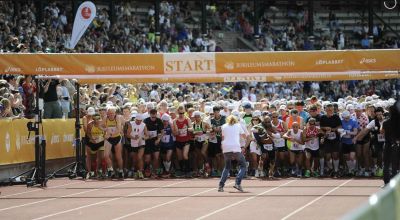 |
|||||||||||||||||||||||||||||||||||||||||||||||||||||||||||||||||
| The out-back course followed the original route as closely as possible, although major highway construction has significantly changed the 1912 road layout. The general aspect of the course though, taking an undulating route though woodlands to a turning point at the outlying settlement of Sollentuna, remains unchanged. The turning point has changed, with the monument marking the original turn location having been moved about 100m south to a spot directly outside Sollentuna Chuch. This allowed for much easier passage of the 8,000-strong field on the day, and also ended up slightly reducing the original distance from 40.2km to 40.075km. | |||||||||||||||||||||||||||||||||||||||||||||||||||||||||||||||||
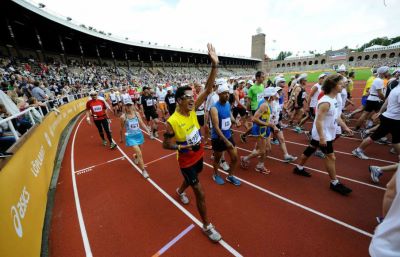 |
|||||||||||||||||||||||||||||||||||||||||||||||||||||||||||||||||
|
|
|||||||||||||||||||||||||||||||||||||||||||||||||||||||||||||||||
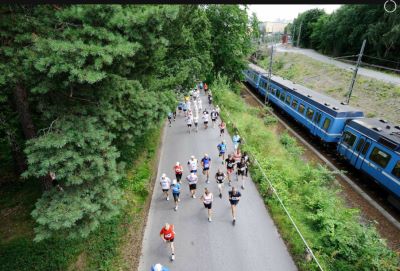 |
|||||||||||||||||||||||||||||||||||||||||||||||||||||||||||||||||
| Several runners were attempting to replicate particular performances of yesteryear. Anders Allgren had been first to exit the stadium in 1912, so his modern-day stand-in raced the first 300m. Several dozen of runners wore 1912 costume, including the knotted white handkerchiefs or other headgear designed to protect against the blazing sun and 30C temperatures. A hundred years later the weather was much kinder: sunny, but with a peak temperature of only 20C. Another runner in 1912, Shizo Kanaguri, had dropped out of the race in 1912 in Sollentuna, shortly after making the turn and had returned to Japan without informing race officials. Several decades later Swedish journalist Oscar Söderlund penned a myth about how Kanaguri had disappeared without trace during the marathon and had never been seen since. In fact he had taken lemonade in the garden of the Petre family in Sollentuna before returning to Stockholm. The site of this house has now been engulfed by major new development in Sollentuna. Kanaguri did not prove hard to track down in his home town of Tanama and in 1966 returned to Stockholm to "finish" his race in a time of 54 years, 8 months, 6 days, 8 hours, 32 minutes and 21 seconds. Kanaguri's great-grandson Yoshiaki Kurado, a 24-year old bank clerk in Tanama, who considers himself an ordinary runner, also completed the Centenary Marathon. Sally Osterberg's story only emerged at the post-race awards ceremony held in the Olympic Stadium the following day when she took second prize in the 1912 fancy dress competition. She explained that she had run in a replica costume of that worn by her grandfather Harry Smith (including a strapping just below the right knee), when he finish 17th in the 1912 Olympic race. | |||||||||||||||||||||||||||||||||||||||||||||||||||||||||||||||||
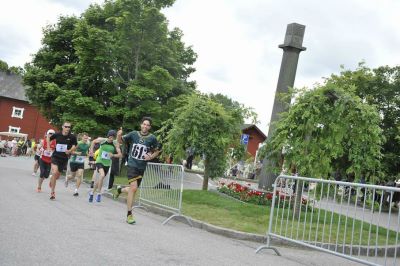 |
|||||||||||||||||||||||||||||||||||||||||||||||||||||||||||||||||
| Former Stockholm City Marathon winner Anders Szalkai, now part of the Stockholm Marathon organising team, took the part of 1912 Olympic Champion from South Africa, Kennedy Kane McArthur. Wearing South African colours and McArthur's race number of 631, he paced himself around the course just slightly too fast. After hesitating in the finishing straight he passed over the finish line in the 1912 winning time, and then Olympic Marathon record, of 2:36:54.8 | |||||||||||||||||||||||||||||||||||||||||||||||||||||||||||||||||
|
|
|||||||||||||||||||||||||||||||||||||||||||||||||||||||||||||||||
14 July: Stockholm set the Olympic mould, claims
organiser.
Anders Olsson, founder of the Stockholm Marathon and instigator of the Stockholm Olympic Centenary Marathon claimed on the eve of the commemorative race that the model according to which the modern Olympic Games are organised was substantially defined by those conducted in Stockholm in 1912. Olsson has made it his mission over the last four years to study the 1912 Games in minute detail, starting with the 1400-page official report of the Games of the 5th Olympiad. Addressing invited guests near to the 1912 Marathon turning point Olsson detailed how the Olympic Games had changed in the 16 years since their inauguration in Athens. Previously a collection of disparate sporting competitions held over a period of months, from 1912 the Games became something like the current more cohesive presentation lasting 2-3 weeks. The Marathon itself, however, was already well established in the public consciousness through the dramatic races in the First and Fourth Olympiads, won by Spiridon Louis and Johnny Hayes respectively. The infamous 1908 race, featuring the assistance of the distressed Dorando Pieti over the finish line and his subsequent disqualification, in particular came to define the distance. The hot conditions that day (28C) also sent warning signals to the Stockholm organisers, who put in place comprehensive medical facilities. But Stockholm proved hotter still, with temperatures upwards of 30C, leading to the only Olympic Marathon fatality to date, when Portugal's Francisco Lazaro collapsed around 30km and later died of hyperthermia. |
|||||||||||||||||||||||||||||||||||||||||||||||||||||||||||||||||
|
On 15 July The Yangmingshan Cross Country Half Marathon
(more)
was run on roads despite its
name, which refers rather to its location within the Yangmingshan National Park in Chinese Taipei. The
Marathon de l'Ile Maurice
(more)
took place on a scenic
route along the coast of the Indian Ocean island of
Mauritius.
|
|||||||||||||||||||||||||||||||||||||||||||||||||||||||||||||||||
|
|
|||||||||||||||||||||||||||||||||||||||||||||||||||||||||||||||||
10 July: Shizo Kanaguri was one of the 34 runners who
dropped out of the 1912 Olympic Games Marathon in Stockholm,
as a result of temperatures reaching 30C. Decades later a
Swedish journalist created a myth around him as “The
Japanese who disappeared”.
After Kanaguri dropped out of the race (in some accounts he was reported to have lost consciousness) he took a glass of lemonade in the garden of the Petré family in Sollentuna, at the halfway point of the race. He then took the train back to Stockholm and a few days later started the long journey back to Japan without ever contacting race officials. |
|||||||||||||||||||||||||||||||||||||||||||||||||||||||||||||||||
|
|||||||||||||||||||||||||||||||||||||||||||||||||||||||||||||||||
| Kanaguri lived in Tanama, in the south of Japan, for most of
his life. He was appointed an Honorary Citizen of the town
in acknowledgement of his pioneering long distance running
efforts. In 1967, at age 76, he was invited back to
Stockholm to symbolically finish his marathon. He accepted,
completing in a time of 54 years, 8 months, 6 days, 8 hours,
32 minutes and 21 seconds. A hundred years after the Stockholm Olympic Marathon Kanaguri's great-grandson, Yoshiaki Kurado, wants to fulfill his great-grandfather's legacy by completing Stockholm's Centenary Marathon. Kurado is a 24-year old bank clerk in Tamana, who considers himself an ordinary runner. He will come to Stockholm with the town's mayor Tetsuyeva Tagasaki. |
|||||||||||||||||||||||||||||||||||||||||||||||||||||||||||||||||
|
|
|||||||||||||||||||||||||||||||||||||||||||||||||||||||||||||||||
Stockholm Olympic Centenary Marathon
09 July: On 14 July 2012, 100 years to the day since the 1912 Olympic Marathon was held in Stockholm, a special race will be staged to celebrate this particular Olympic centenary. Stockholm Marathon founder and founder member of AIMS, Anders Olsson, has planned the event for several years. Although attempting to stay as close as possible to the format of the original race, the big difference is that there are 10,436 runners entered instead of 69. Another likely difference is that runners will not face the torrid conditions endured by the 1912 Olympic runners. |
|||||||||||||||||||||||||||||||||||||||||||||||||||||||||||||||||
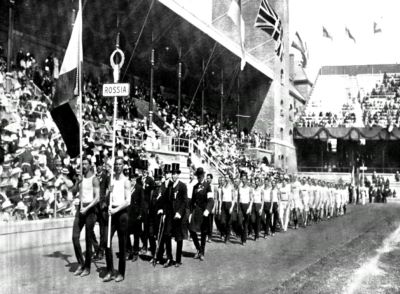 |
|||||||||||||||||||||||||||||||||||||||||||||||||||||||||||||||||
| They battled 30C temperatures which reduced their number to only 34 at the finish line. One of those who did not complete was the Portuguese Francisco Lazaro, who died from hyperthermia. | |||||||||||||||||||||||||||||||||||||||||||||||||||||||||||||||||
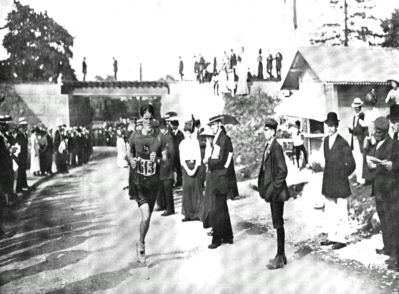 |
|||||||||||||||||||||||||||||||||||||||||||||||||||||||||||||||||
| He remains the only fatality in Olympic Marathons. By contrast, runners in the "Jubilee Marathon" in Stockholm will likely encounter thundery showers, with a high of only 21C. For the full story see: http://www.jubileumsmarathon.se, or read the article in the latest edition of Distance Running (link to article) | |||||||||||||||||||||||||||||||||||||||||||||||||||||||||||||||||
|
On 7 July the Zermatt Marathon
(more)
was run in Switzerland from St Niklaus (1085m) to the
summit of Riffelberg (2585m) with 29 4000m Alpine
summits towering above.
On 8 July the Sotokoto Half Marathon (more) took place in Kenya before action shifted to South America, with the Rio de Janeiro Marathon (more) in Brazil, the Maraton de Quito (more) at 2800m altitude in the Ecuadorean capital and the Correcaminos Half Marathon and 10km (more) in the capital of Costa Rica, San Jose. |
|||||||||||||||||||||||||||||||||||||||||||||||||||||||||||||||||
|
|
|||||||||||||||||||||||||||||||||||||||||||||||||||||||||||||||||
05 July: US broadcaster Toni Reavis has drawn up a
petition to the International Olympic Committee calling for
the inclusion of Olympic Marathon team medals and the
addition of an Olympic Road Relay starting from 2020. Reavis
cites the worldwide reach and popularity of road running as
reason “to grant the distinct sport of Road Racing the
recognition it merits and truly deserves”. He also argues
that enhanced Olympic recognition and “distance running’s
proven impact on the health and well-being of its
practitioners” would help to combat ““the on-going epidemic
of childhood obesity continuing to exact its tragic toll in
many developed countries of the world”. (Read
more)
|
|||||||||||||||||||||||||||||||||||||||||||||||||||||||||||||||||
|
On 30 June three marathons were held in northern
Europe, benefitting from the long summer daylight hours.
The Paavo Nurmi Marathon
(more),
in the "Flying Finn's" hometown of Turku is the most
southerly, at 60.5degN. Elsewhere in Finland the
Rovaniemi Marathon
(more)
was run right on the Arctic Circle (66.5degN). Then in
Tromso, in the north of Norway the Midnight Sun
Marathon
(more)
took place at 70degN in 24-hour daylight.
On 1 July, at the other end of the earth, the Gold Coast Airport Marathon (more) offered a full range of supporting races alongside the title event on Australia's Gold Coast. Returning to near where the weekend's action started, the Ergo White Nights Marathon (more) was run in Saint Petersburg, Russia's "Venice of the North" on the Gulf of Finland. |
|||||||||||||||||||||||||||||||||||||||||||||||||||||||||||||||||
|
|
|||||||||||||||||||||||||||||||||||||||||||||||||||||||||||||||||
28 June: The Gold Coast Airport Marathon is
attracting greater and greater participant numbers and more
of them are travelling from overseas, which impacts very
favourably on the local economy. Entries close on 29 June
and around 28,000 are expected - 3,000 up from last year. So
far 7000 of them are Australians from outside of Queensland
and 2160 from 30 overseas countries. Entry figures have
increased every year since 2001, when there were 8000
participants. The countries from where most runners come
this year are: Japan (716), New Zealand (467), Singapore
(308), United States (175), Malaysia (155), Taiwan (99),
Hong Kong (80) and China (52). Of total entries the Marathon
has received 9660, the Southern Cross University 10km Run
6654, the Queensland Health 5.7km Challenge 3777 and the
Dreamworld Junior Dash 1402. The Gold Coast Airport Marathon
could break the record for the most finishers in an
Australian marathon, which is currently 5073 in the 2010
Melbourne Marathon.
|
|||||||||||||||||||||||||||||||||||||||||||||||||||||||||||||||||
26 June: Guy Morse, BAA Boston Marathon race director
from 1985-2000 and Executive Director until 2010 will retire
at the end of this year after 28 years of service. His
current position is Senior Director of External Affairs.
"Having served the BAA for almost three decades, I look back upon our accomplishments knowing that we are among the most prestigious and stable sports organisations in the world” said Morse. “I have been delighted to contribute. We stand on solid ground; I am proud of the work we did, particularly in the difficult period bridging the 1980s and 1990s, when we essentially rebuilt the organization.” Morse’s direct achievements include securing decades-long corporate sponsorship agreements, including from John Hancock Financial Services and adidas, instituting equal prize money between men and women, conducting the historic Centennial Boston Marathon in 1996, which was a milestone in the sporting world and included the world's largest field at the time (only surpassed a decade later), developing a year-round BAA schedule of events including the BAA Half Marathon, youth initiatives, and clinics, hosting the 2008 US Women’s Olympic Trials, and creating the BAA's charitable drive, now exceeding $125 million raised in total. BAA President Joann Flaminio said: “The BAA has never been stronger [thanks to] Guy’s expertise and leadership. The BAA is grateful for his loyalty and commitment which has encompassed an entire career.” Depending upon the agreement of the BAA, Morse will remain their AIMS representative, and through this channel of friendship will seek opportunities and offer his experience to the benefit of Marathons throughout the world. |
|||||||||||||||||||||||||||||||||||||||||||||||||||||||||||||||||
|
On 21 June (midsummer equinox) the Suzuki
Midnight Sun Run
(more)
took place in Iceland's capital city, Reykjavik. It
started at 21.20 so, apart from the leading runners,
people were finishing around midnight - while it was
still light. Reykjavik, at 64degN, it is only slightly
short of the Arctic Circle, so the sun dips momentarily
below the horizon.
On 23 June the Olomouc Half Marathon (more) continued the RunCzech series, as the success of the Prague Marathon spreads its benefits to the rest of the Czech Republic, followed by the Vidovdan 10km Road Race (more) in Bosnia. On 24 June the Lake Saroma 100km (more) was run in the northernmost island of the Japanese archipelago, Hokkaido, followed by the Standard Chartered KL Marathon (more) in the more steamy conditions offered by the Malaysian capital. Action then leaped into the western hemisphere with the Tangamanga Marathon (more) in Mexico and the Scotiabank Vancouver Half Marathon (more) on the Canadian Pacific seaboard. |
|||||||||||||||||||||||||||||||||||||||||||||||||||||||||||||||||
|
On 16 June the Santa Claus Marathon
(more)
was run in Rovaniemi (FIN) and the Portumna Forest
Marathon
(more)
in Ireland.
In the Sao Paulo Marathon (more) on 17 June Brazil scored a home win in the men's race with Solonei Rocha Da Silva posting 2:12:25 four minutes ahead of traditional Kenyan opposition. East Africans took the top 4 places in the women's race, with Rumokol Elizabeth Chepkanan sealing the win in 2:31:31. In the Gatorade Panama International Half Marathon (more) it was also E Africa vs. S America with Ethiopian Alene Reta taking the men's race and Kenya's Grace Wantubi the women's, but with Ecuadorean and Colombian opposition running them close. Back in seventh place in the women's race Panamanian Griselda Martinez ran 1:30:26 to win the "supervet" over-60 class. |
|||||||||||||||||||||||||||||||||||||||||||||||||||||||||||||||||
|
The inaugural Half Marathon Ceske Budejovice
(more)
was held on 9 June as part of the RunCzech
series.
On 10 June the Manley Soft Sand Classic 21km (more) took place on the beaches of Sydney's salubrious suburb and, also in a beach setting, the 7th Laguna Phuket Marathon (more) was run in the Thai resort town. |
|||||||||||||||||||||||||||||||||||||||||||||||||||||||||||||||||
|
|
|||||||||||||||||||||||||||||||||||||||||||||||||||||||||||||||||
08 June: A squad of 11 Indigenous and Torres Strait
Islander runners selected by the
Indigenous Marathon Project
will run at this years Gold Coast Airport Marathon on
1 July in preparation for the New York City Marathon later
in the year.
The six male and five female runners in the Indigenous Marathon Project are being mentored by Gold Coast Airport Marathon Ambassador and four-time Olympian Robert de Castella. The Indigenous Marathon Project, which started in 2010, annually selects a group of young Indigenous men and women to compete in the New York City Marathon with the overall goal of increasing physical activity and promoting healthy lifestyles in Indigenous communities. Indigenous Marathon Project founder and mentor Robert de Castella said the Gold Coast Airport Marathon will be an eye-opening experience for the group as they continue their journey to New York in November. "Imagine coming from one of the most remote, isolate and driest parts of Australia to run among tens of thousands in the Gold Coast Airport Marathon", said de Castella. Most of them didn't know what a marathon was in February but at Gold Coast they will be running a half marathon off just three months training as they track towards the New York City Marathon in four months' time. The Indigenous Marathon Project is an important aspect of the Gold Coast Airport Marathon. Last year Gold Coast welcomed more than 50,000 visitors for the event, building Queensland's reputation as Australia's number one tourist destination. More than 130 people applied to be part of the Indigenous Marathon project with the final 11 chosen after lengthy national try-outs and interviews. |
|||||||||||||||||||||||||||||||||||||||||||||||||||||||||||||||||
|
|
|||||||||||||||||||||||||||||||||||||||||||||||||||||||||||||||||
|
The Cork City Marathon
(more)
was held on 4 June
in Ireland
In the Comrades Marathon
(more),
89km from Pietermaritzburg to Durban on 3 June
Elena Nurgalieva triumphed for the seventh time, but
only a little over a minute ahead of Briton Ellie
Greenwood. |
|||||||||||||||||||||||||||||||||||||||||||||||||||||||||||||||||
|
|
|||||||||||||||||||||||||||||||||||||||||||||||||||||||||||||||||
|
|||||||||||||||||||||||||||||||||||||||||||||||||||||||||||||||||
| The Ottawa Marathon (more) was run in the Canadian capital followed by the Scotiabank Calgary Marathon (more) in the western province of Alberta. | |||||||||||||||||||||||||||||||||||||||||||||||||||||||||||||||||
|
|
|||||||||||||||||||||||||||||||||||||||||||||||||||||||||||||||||
|
On 19 May the Great Wall Marathon
(more)
took place in China, followed by the Three
Hearts Marathon
(more)
in Slovenia.
On 20 May the Moscow Marathon Luzhniki was run in the Russian capital, the Nordea Riga Marathon (more) in Latvia, the Nykredit Copenhagen Marathon (more) in Denmark, the iWelt Wurzburg Marathon (more) in Germany and the Douro Valley Half Marathon (more) in Portugal. The Lima 42k is held in South America. |
|||||||||||||||||||||||||||||||||||||||||||||||||||||||||||||||||
|
|
|||||||||||||||||||||||||||||||||||||||||||||||||||||||||||||||||
FOUNDING FATHER OF THE MARATHON
18 May: At a meeting held immediately following the 19th World Congress of AIMS the AIMS Board decided to grant 2000 Euros (c.$2500) for the restoration of the tomb of Michel Breal. These funds will be matched by an equal contribution from IAAF. Michel Breal (1835-1915) was the man who proposed the Marathon as an official event within the first modern Olympic Games in 1896. The Marathon as we know it sprang directly from this proposal that Breal made to the founder of the Modern Olympic Games, Pierre de Coubertin. In 2009 Prof Hans Giessen, the Vice-President of the Michel Breal Society (based in Landau, Germany, Breal's birthplace) was in Montparnasse Cemetery in Paris and saw a sign on Breal's tomb saying that the tomb was in "a state of abandonment" and was in the process of being "reclaimed”. Being reclaimed seems to mean the plot being reclaimed and, amazing as it may sound, the grave bulldozed. Prof. Giessen wrote to the Conservateur of the Ville de Paris asking if they could not maintain the grave of such an illustrious French citizen (who was a famous philologist, reputedly founding the discipline of Semantics and founding two schools). The answer was a firm no: that it was the duty of the family to maintain the tomb (to which Breal was the last addition). Apprised of this, two years ago the descendants of Breal, Katherine Brunt (89) Breal's great-granddaughter and her daughter Henrietta Parsons, obtained a quote for the work required amounting to 3610 Euros. This included fixing the cracked marble plinth upon which the tomb stands (cited by the Conservateur as a health and safety hazard) and cleaning of the gravestone itself. The costs split 2600/1000 between these operations but both are required by the Conservateur. The family sought assistance from official bodies, and although 1500 Euros was offered, this was dependent upon a time limit which has recently expired. The joint funding from AIMS and IAAF secures an important element of the Marathon's patrimony for future generations. |
|||||||||||||||||||||||||||||||||||||||||||||||||||||||||||||||||
|
On 12 May the 26th Dalian International
Marathon
(more)
took place in China, the Bozcaada Half
Marathon and 10km
(more)
in Turkey and the Goteborgsvarvet Half
Marathon
(more)
in Sweden, where Victor Kipchirchir and Hilda
Kibet took top honours in times of 1:00:25 and 1:09:27
The 19th World Congress of AIMS (more) was conducted in Prague from 10-12 May (see separate news item below), followed by the Volkswagen Prague Half Marathon (more). In the race Deresse Chimsa won, posting the second fastest ever time on the course of 2:06:25, while Agnes Kiprop caught race favourite and longtime race leader Lydia Cheromei at 38km, going on to win in 2:25:41. The Tripoli Int'l Half Marathon (LIB), scheduled on 13 May, was postponed at the last moment when, only eight hours before the off, explosions were heard throughout the city. Clashes peaked at dawn - the normal start time - and race organisers had no option but to postpone. |
|||||||||||||||||||||||||||||||||||||||||||||||||||||||||||||||||
|
|
|||||||||||||||||||||||||||||||||||||||||||||||||||||||||||||||||
|
|
Women Runner Overtake Men - in America
Kathrine Switzer told the world’s marathon and running experts
that women comprise 53% of all runners in America, and so now
outnumber men, at the 19th World Congress of AIMS in Prague,
Czech Republic (10-12 May 2012).Kathrine Switzer is well known as the woman who changed history when she covertly entered the Boston Marathon in 1967. Women were not allowed to run in the race and an event official tried to forcibly remove Kathrine from the race. Her then boyfriend, running alongside her, thwarted the attempt and she became the first woman to complete the Boston Marathon. The picture of the incident was listed as one of Time-Life’s “100 Photos that Changed the World.” |
||||||||||||||||||||||||||||||||||||||||||||||||||||||||||||||||
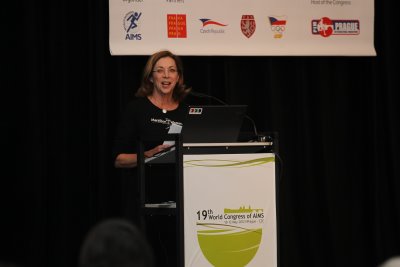 |
|||||||||||||||||||||||||||||||||||||||||||||||||||||||||||||||||
|
Kathrine Switzer commented: ‘women runners now outnumber men in
America; women now represent 53% of runners. Women feel
empowered by running and love the feeling of community and good
health that comes with a running lifestyle.’ The AIMS Congress, in addition to discussing ways of encouraging more women from around the world to take up running, featured subjects such as disaster recovery at events. This included a presentation by Richard Donovan from Galway, Ireland who is race director of the North Pole Marathon. Part of Richard’s planning involves avoiding polar bear attacks. The terms and conditions of the race include a disclaimer warning of the possibility of, apart from polar bear attacks, hypothermia, the loss of fingers, toes and other body parts. The AIMS Congress represents 328 races in over 100 countries and saw the following representatives elected in Prague to the Board of Directors: |
|||||||||||||||||||||||||||||||||||||||||||||||||||||||||||||||||
|
|||||||||||||||||||||||||||||||||||||||||||||||||||||||||||||||||
|
Five races/venues bid for the right to stage the 20th World
Congress of AIMS. The winning bid was from the Comrades Marathon
so the next AIMS Congress will be in Durban, South Africa on
28-31 May 2014. AIMS President Paco Borao comments: ‘The marathon and running movement continues to grow around the world contributing to a healthy lifestyle and more and more bringing people together through sport creating new friendships across borders. The Tokyo Marathon alone attracts applications from 280,000 people. It is very pleasing to see the increase in women taking up running and we will continue to work to encourage even more women to enjoy the benefits of the world’s original and most affordable sport.’ |
|||||||||||||||||||||||||||||||||||||||||||||||||||||||||||||||||
|
|
|||||||||||||||||||||||||||||||||||||||||||||||||||||||||||||||||
|
The new AIMS board: Back Row left to right – Gary Boshoff, Keisuke Sawaki, Guy Morse, Fernando Jamarne, Bruno Boukobza, Theodosis Livitsanos, Front Row left to right - Al Boka, Dave Cundy, Martha Morales, Paco Borao, Allan Steinfeld, Carlos Moya, Hugh Jones. (Absent from photo - Mark Milde) |
|||||||||||||||||||||||||||||||||||||||||||||||||||||||||||||||||
|
|||||||||||||||||||||||||||||||||||||||||||||||||||||||||||||||||
| The Volgograd Marathon was run in Russia, the Skopje Marathon (more) in the Republic of Macedonia and the Maratona d'Europa in the city of Trieste, Italy. Across the Atlantic the Goodlife Fitness Toronto Marathon was run through the streets of Canada's largest city, followed by the BMO Vancouver Marathon (more). | |||||||||||||||||||||||||||||||||||||||||||||||||||||||||||||||||
|
On 29 April the Gunsan Saemangeum
International Marathon was held in the
Saemangeum-Gunsan Free Economic Zone in Korea.
In the 27th Haspa Marathon Hamburg (more) both course records fell: Ethiopia's Shami Dawit posted 2:05:58, while in the women's race Rael Kiyara beat Netsanet Abeyo 2:23:47 to 2:24:12. Both course records were also broken in the 10th Metro Group Marathon Dusseldorf (more) where Seboka Deriba Tola ran 2:08:27 and Agnes Barsosio Jeruto 2:25:49. Bernard Koech dipped under the hour in the 21st edition of the Semi-Marathon International de Nice (more) with a time of 59:57. The Big Sur International Marathon (more) celebrated its 27th presentation along California's scenic Pacific coastline. |
|||||||||||||||||||||||||||||||||||||||||||||||||||||||||||||||||
25 April: The one-of-a-kind trophy awarded to
Spiridon Louis for winning the first Olympic Marathon
fetched a record price of £541,250 (approximately $868,000)
in auction at Christie's in London on 18 April, and will
stay in Greece. The Silver Cup was originally presented by
Michel Breal after he suggested the inclusion of a
long-distance race from Marathon to Athens within the
programme of the Inaugural Modern Olympic Games held in
Athens in 1896. The cup had been held by the Louis family
since 1896 and was offered for auction by Louis' grandson,
also named Spiridon.
|
|||||||||||||||||||||||||||||||||||||||||||||||||||||||||||||||||
|
|||||||||||||||||||||||||||||||||||||||||||||||||||||||||||||||||
| The Cup will go on permanent display at a cultural center in 2015. | |||||||||||||||||||||||||||||||||||||||||||||||||||||||||||||||||
23 April: The second edition of the AIMS
Children's Series took place on 21 April 2012, starting
and finishing at the Tushikamane Care secondary school in
Tanzania.
|
|||||||||||||||||||||||||||||||||||||||||||||||||||||||||||||||||
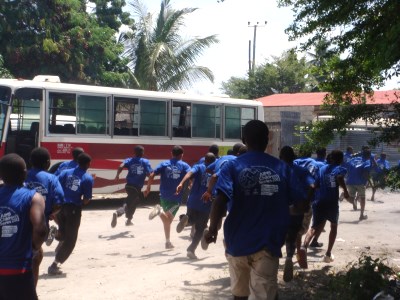 |
|||||||||||||||||||||||||||||||||||||||||||||||||||||||||||||||||
| The
under-13 girls opened proceedings, followed 15 minutes later by the
under-13 boys. The under-17 races followed. There were 400 runners,
all orphans and children living in difficulty, recruited from
schools around the locality. They ran in under-17 and under-13 age
categories for both boys and girls. Boys wore blue round neck AIMS
t-shirts and girls wore white round neck AIMS t-shirts. After the
race the children were provided with refreshments and served a
buffet lunch. The event was coordinated between Infosol Tanzania and
Tushikamane Children’s Care Trust Fund. The organizing team involved
20 teachers recruited from all nine schools involved, 2 nurses, 10
Traffic police, 10 security personnel and 2 doctors. Every participant was awarded a medal provided by AIMS, the first 3 winners of each category were acknowledged and awarded an extra gift of school equipment. |
|||||||||||||||||||||||||||||||||||||||||||||||||||||||||||||||||
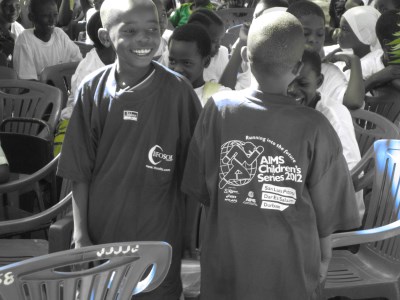 |
|||||||||||||||||||||||||||||||||||||||||||||||||||||||||||||||||
| AIMS would like to thank the sponsors who made this extraordinary race possible: ASICS, OPAP and the TOKYO MARATHON FOUNDATION. Thanks are further extended to all the AIMS membership who contribute to the care of children by promoting the sport of running. | |||||||||||||||||||||||||||||||||||||||||||||||||||||||||||||||||
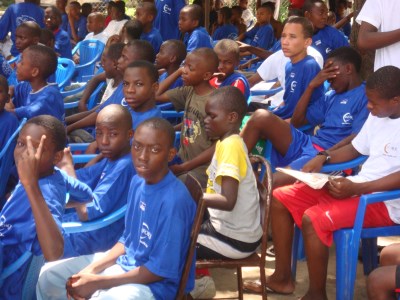 |
|||||||||||||||||||||||||||||||||||||||||||||||||||||||||||||||||
| The Children's Series events are helping to bring unity to the world through a common language: that of “RUNNING”. This experience will last forever in the hearts of the children and the sport of running will become part of their lives. | |||||||||||||||||||||||||||||||||||||||||||||||||||||||||||||||||
|
Apart from the Steinmetz Gaborone Marathon
(more)
in Botswana on 22 April, all other action is in
Europe. The Cracovia Marathon
(more)
was run in Poland, the Banca Intesa Belgrade Marathon
(more)
in the Serbian capital, the Maratona Sant'Antonio
(more)
in the north of Italy, the Zurich Marathon
(more)
in the Swiss finance centre, the DVV Antwerp Marathon
(more)
in Belgium, the Enschede Marathon
(more)
in the Netherlands and the Rock 'n' Roll Madrid
Marathon
(more)
in the Spanish capital.
|
|||||||||||||||||||||||||||||||||||||||||||||||||||||||||||||||||
|
On 14 April the Pardubice Wine Half Marathon
(more)
was held in the Czech Republic.
On 15 April the spring marathon season kicked off with a vengeance: the Nagano Olympic Commemorative Marathon (more) started proceedings, but in Europe the ABN AMRO Rotterdam Marathon (more) topped the listings, with Yemane Adhane just nipping countryman Getu Feleke 2:04:48 to 2:04:49 and Tiki Gelana becoming the fourth fastest woman ever (2:18:58). In the Paris Marathon (more) both Stanley Biwott and Tirfi Beyene set a new course records of 2:05:11 and 2:21:39 while in the Vienna City Marathon (more) Henry Sugut set a new course record of 2:06:58 and Fate Tola defended her title in 2:26:39. In the Barclays Milano Marathon (more) Daniel Kiprugut Too won in 2:08:39 and Irene Jerotich Kosgei in 2:31:07 Across the Atlantic the Sao Paulo Half Marathon Corpore (more) was run in Brazil and the Vancouver Sun Run 10km (more) on Canada's Pacific west coast. On 16 April the BAA Boston Marathon (more) celebrated its 116th running. |
|||||||||||||||||||||||||||||||||||||||||||||||||||||||||||||||||
|
On 6 April the Dead Sea Ultramarathon
(more)
was run in Jordan.
On 7 April, Easter Saturday, the Two Oceans Marathon (more) (56km) in Cape Town was won by Stephen Muzhingi of Zimbabwe in 3:08:08 and Elemi Nurgalieva (RUS) in 3:41:55. In the North Pole Marathon (more) Race medical director Andrew Murray took top honours with a time of 4:17:08. First female finisher was Australian Richelle Turner in 6:06:33. On 8 April the Daegu International Marathon (more) took place in Korea. |
|||||||||||||||||||||||||||||||||||||||||||||||||||||||||||||||||
7 April: Olympic Marathon winner Rosa Mota will join
expert speakers who will give presentations at the 19th
World Congress of AIMS in Prague from 10-12 May. Topics
to be covered vary from Raising Sponsorship for Smaller
Events and Community Involvement in Races to Disaster
Recovery. Mota, and running pioneer Kathrine Switzer
(previously announced), will address how to inspire women
and increase their participation in running events.
Attracting Sponsorship Vivek Singh, of the Mumbai Marathon, Greg Hooton, from the Melbourne Marathon, and Kire Sinadinovski, of the Skopje Marathon, will talk on the topic of ‘Raising Sponsorship for Smaller Events’, a topic that will be particularly relevant to race directors of smaller races around the World. Involving the community Guy Morse, of the Boston Marathon, and Alan Brookes, of the Toronto Waterfront Marathon, will present on ‘Community Involvement’ in races. What to do when disaster strikes Richard Donovan, the race director of the North Pole Marathon and Antarctic Ice Marathon and 100km will present on the topic of ‘Disaster Recovery’. This is an especially relevant topic with a number of races around the World cancelled or postponed for a variety of reasons. In February this year, Richard set a new World Record by running seven marathons on seven continents in four days, twenty-two hours and three minutes. Inspire women runners Rosa Mota, widely considered to be one of the best marathon runners of the 20th century with Olympic, World Championship and European Championship Gold Medals to her name, joins the Congress to speak about women in running The above are in addition to the keynote speakers previously announced, Kathrine Switzer and her husband Roger Robinson. Their presentation “Women in Running” will provide insights into how race directors can increase female participation in their events. The 19th Congress, at the Hilton Prague hotel, marks AIMS' 30th year of running history, The Congress will give race organisers the chance to promote their races to over 36,000 international runners and visitors at the Marathon Sport Expo. The weekend wraps up with the Volkswagen Prague Marathon on 13 May. To date 87 races from 46 countries in 6 continents have registered. The highest participation shown is from Russia (8 races). |
|||||||||||||||||||||||||||||||||||||||||||||||||||||||||||||||||
6 April: The UVU North Pole Marathon has been
delayed so that a landing runway could be completed at the
North Pole. A Russian logistics company parachuted a tractor
and personnel onto a suitable ice flow to create the runway,
but it took longer than expected due to extreme cold (as low
as -50C) and very rugged ice. The runway, which is literally
carved into the ice on the Arctic Ocean, must be capable of
landing an AN-74 jet safely and the logistics experts wanted
a runway at least 800m long. This safety requirement has now
been satisfied.
Competitors and additional support personnel will leave Spitsbergen island (78degN, north of mainland Norway) in two groups tomorrow morning. The first group of 25 will depart at 08:00 GMT and fly for 2.5 hours to reach the Ice camp. The Antonov 74 jet will then return to collect the second group of 25, which will depart at 15:00 GMT. The current temperature at the North Pole is -25C with clear blue skies and low winds -- perfect conditions for marathon running. There will be 40 athletes from 18 countries taking part in the event. The race will also be chip-timed - a first for any polar event. |
|||||||||||||||||||||||||||||||||||||||||||||||||||||||||||||||||
|
Eight AIMS races took place on 1 April. In the
Vattenfall Berlin Half Marathon
(more),
five men ran under the hour, with Denis Koech winning in
59:14 by a single second from Wilson Kiprop. In the
women's race Philes Ongori prevaied by a similar margin
over Helah Kiprop, (1:08:25 to 1:08:26). In the
Poznan Half Marathon
(more),
winners were Solomon Kiptoo in 1:02:00 and Lucy Njeri in
1:10:26. The Alexander the Great Marathon
(more)
in Greece, the Bratislava Marathon
(more),
and the Medio Maraton de Madrid
(more)
all took place elsewhere in Europe. The Semi Marathon
International de Rabat
(more)
was run in the Moroccan capital, the Punta Cana Half
Marathon and 10km in the Dominican Republic and the
mds - Maraton de Santiago
(more)
in the capital of Chile.
In the Hervis Prague Half Marathon (more) on 31 March Atsedu Tsegay had a runaway win with a world-leading time of 58:47. He was over 400m clear of second-placed Henry Kiplagat, who just failed to break the hour. Joyce Chepkurui won the women's event in 1:07:03, 23 seconds ahead of Lydia Cheromei. The Tel-Aviv Marathon (more) was held in Israel on Friday 30 March. |
|||||||||||||||||||||||||||||||||||||||||||||||||||||||||||||||||
31 March: The popular Dutch race Dam tot Damloop,
to be run over 10 miles (16.1 km) from Amsterdam to Zandam
on 23 September, sold out nearly all 40,000 available places
within hours. Registration had to be delayed despite several
measures taken to improve the capacity of the website. The
enormous interest in the run was even greater than expected.
Organizer Le Champion regrets the inconvenience caused.
Runners who still want to participate can contact one of the
charity organizations, which can be found at
www.damloop.nl. Last year the Dam tot Dam Charity
Project collected a total of € 612,000.
|
|||||||||||||||||||||||||||||||||||||||||||||||||||||||||||||||||
|
|
|||||||||||||||||||||||||||||||||||||||||||||||||||||||||||||||||
|
|
|||||||||||||||||||||||||||||||||||||||||||||||||||||||||||||||||
26 March: Registration for the Athens Classic
Marathon 2012, to be held on Sunday 11 November, opened
two weeks ago, and numbers are limited Despite the economic
troubles in Greece and elsewhere running has proved a
recession-resistant industry. Two years ago, in celebration
of the 2500th anniversary of the Battle of Marathon,
marathon entries jumped from below 4000 to a limit of
20,000.
This year is the 30th anniversary of the event’s revival, and a limit of 30,000 runners has been imposed for the three events of 5km, 10km, and the Marathon with 12,500 of them reserved for the full distance. Organisers urge prospective marathoners to get their entries in soon. The race from Marathon to Athens is the original marathon, first run in 1896 as a trial for the Greek Olympic team and then later that year for the first Olympic Games of the modern era. Over the last 30 years the same course has been used for the Marathon event of the 1982 European Athletics Championships (where Rosa Mota won the first ever official IAAF women’s marathon), for the 1997 IAAF World Championships, and for the 2004 Athens Olympic Games. In tandem with the race’s 30th anniversary, it is also the 30th anniversary of the founding of AIMS, which opened its international office in Athens last year. The many invitees for this year’s race will include marathon luminaries and legends of the past. |
|||||||||||||||||||||||||||||||||||||||||||||||||||||||||||||||||
|
On 25 March the Int'l Novi Sad Half Marathon
(more)
was run in Serbia, the Ferrara Marathon
(more)
took place in the north of Italy and the Zurich
Marato de Barcelona
(more)
in Spain. The EDP Half Marathon of Lisbon
(more)
was won for the third consecutive time by Zersenay
Tadese, although a minute slower than in either of the
two previous years.
|
|||||||||||||||||||||||||||||||||||||||||||||||||||||||||||||||||
20 March: Former footballer, Pavel Nedved, who won
the Golden Ball award for the best European footballer in
2003, will run the Hervis Prague Half Marathon.
Nedved, now 39, ran here in 2009. "After two years I am looking forward to taking on the Prague half-marathon course. I see the half-marathon as a tough test in preparation for the Prague Marathon in May. Depending on my shape, I’ll take the decision about whether to try the whole one”, he said. Nedved ran 1:49:44 last time and had said: "I'm really pleased. It was my aim to run it in under two hours". Last September he ran the 10km Mattoni Grand Prix evening race in 46:26 and said "I would love to complete the full marathon one day. I’m going to try to make it happen next May in Prague". |
|||||||||||||||||||||||||||||||||||||||||||||||||||||||||||||||||
17 March: WORLD RENOWNED SPEAKERS KATHRINE SWITZER AND
ROGER ROBINSON HEADLINE AIMS WORLD CONGRESS
Kathrine Switzer and her husband Roger Robinson will be the keynote speakers at the 19th World Congress of AIMS in Prague on 10 May with their presentation “Women in Running” focusing particularly on how races can increase female participation. Kathrine was the first woman to ‘enter’ (using only her first initial and surname) the male-only Boston Marathon in 1967. When race officials tried to remove her she was protected by fellow competitors and completed the race. The photo of this incident became one of Time-Life’s “100 Photos that Changed the World.” Kathrine will give personal insights into the early history of AIMS as well as the Avon International Running Circuit she developed. Roger will complement by bringing a wider historical context to the discussion. |
|||||||||||||||||||||||||||||||||||||||||||||||||||||||||||||||||
|
|||||||||||||||||||||||||||||||||||||||||||||||||||||||||||||||||
| Other books
include 26.2 Marathon Stories, co-authored with her husband, and
Running and Walking for Women Over 40. Roger Robinson is an expert speaker, author, journalist, and TV commentator on running. He is an authority on the contemporary sport and its long history and literature. Emeritus professor and formerly Academic Vice-Chancellor of Victoria University in Wellington (NZL) he is now a columnist for "Running Times" (USA). |
|||||||||||||||||||||||||||||||||||||||||||||||||||||||||||||||||
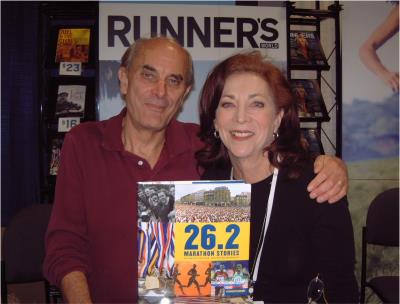 |
|||||||||||||||||||||||||||||||||||||||||||||||||||||||||||||||||
| He has won
three American running journalism awards since 2005 and wins
plaudits as a substantive but vivid and entertaining public speaker.
He represented England, and later New Zealand, wining world masters'
titles and setting masters' records in the Boston, New York,
Vancouver and other marathons and running 2:18:44 at age 40 and
2:28:01 at 50. The 19th World Congress of AIMS, being held in Prague between 10-12 May at the Hilton Hotel, marks AIMS' 30th anniversary. The Congress will give race organisers the chance to promote their races to over 36,000 international runners and visitors at the Marathon Sport Expo prior to the Volkswagen Prague Marathon on 13 May. The registration deadline is the 31 March 2012. Interested races should register at: https://www.europecongress.com/index.php/events/aimscongress The official Congress venue, The Prague Hilton Hotel, is offering attendees discounted accommodation (breakfast included) only up to the registration deadline of the 31 March 2012. To book, visit: http://www.hilton.com/en/hi/groups/personalized/P/PRGHITW-GPIM-20120507/index.jhtml |
|||||||||||||||||||||||||||||||||||||||||||||||||||||||||||||||||
|
The Jerusalem Marathon
(more)
took place on 16 March, supported by half marathon and
10km events which altogether attracted 15000 particpants.
The Suntrust Rock 'n' Roll USA Marathon (and Half Marathon) (more) was run through Washington DC on 17 March. In the Seoul International Marathon (more) on 18 March the first three men broke the old course record as Wilson Loyanae set new figures of 2:05:37 In Europe the GSO Limassol Marathon (more) was held in Cyprus, followed by the 18th edition of the Maratona di Roma (more). In the Italian capital Luka Kanda took the men's title in 2:08:04 and Hellen Kimutai tenaciously clawed back faster starters to come through to win the women's race. Out in the Atlantic and far to the south, the Standard Chartered Stanley Marathon (more) offered runners "gradients, wind and the threat of bad weather" making it "one of the toughest marathon courses." |
|||||||||||||||||||||||||||||||||||||||||||||||||||||||||||||||||
14 March: Haile Gebrselassie returns to the Vienna
City Marathon on 15 April, to run the Half Marathon
staged parallel to the main event. He will be pitted against
British world marathon record holder Paula Radcliffe in the
OMV Champions Race. She had earlier been announced as a
competitor in the half marathon, but will now start with a
time advantage and Gebrselassie will chase her.
“We are absolutely thrilled to be able to present spectators with a race of which you could only dream, between two inspiring personalities and maybe the two best runners ever” said Race Director Wolfgang Konrad. The event will attract more than 33,000 runners. Gebrselassie ran a course record of 60:18 minutes last year, winning a "chase race" against the leading marathon runners, who started ahead of him. He received a tremendous reception from spectators, politicians and even the President of Austria. Gebrselassie was so impressed that he promised to come back - and he does so at the very first opportunity. After a disappointing 4th (2:08:17) in the Tokyo Marathon on 26 February - not fast enough to qualify for the Ethiopian Olympic team - there was doubt regarding the race in Vienna, but it is now confirmed as his next race. Both superstars welcomed the idea of the chase race and confirmed their participation instantly. The time advantage for Paula Radcliffe will be determined nearer to the race. |
|||||||||||||||||||||||||||||||||||||||||||||||||||||||||||||||||
|
The 100km del Sahara
(more)
was held from 6-9 March
in Tunisia.
The Antarctica Marathon (more) took place on 9 March on King George Island. On 11 March the Nagoya Women's International Marathon (more) and the first Kyoto Marathon (more) took place in Japan. Also in its first edition, the Sihanoukville-Cambrew International Half Marathon (more) was run in Cambodia. In Europe the Lago Maggiore International Half Marathon (more) was held along the shoreline of one of Italy's most scenic lakes. Rounding off the day's action the ASTA 10km International de Taroudant (more) was run in Morocco. |
|||||||||||||||||||||||||||||||||||||||||||||||||||||||||||||||||
10 March: (From Reuters) The London auctioneers
Christies announced on 8 March that the grandson of Spyros
Louis, the inaugural Olympic Marathon winner back in 1896,
will put the 15cm silver cup won by his grandfather up for
auction on 18 April, three months before the start of the
London Olympic Games (The Games of the XXX Olympiad).
|
|||||||||||||||||||||||||||||||||||||||||||||||||||||||||||||||||
|
|||||||||||||||||||||||||||||||||||||||||||||||||||||||||||||||||
| His
grandson said he intended to give the sale proceeds - expected to be
between 150,000 and 200,000 euros ($200,000-$265,000) - to his two
children. Patoulidou is leading a campaign to secure funds through sponsorship so that the museum can bid for the cup and ensure that it remains in Greece. Louis was the only Greek athlete to win at the 14-nation 1896 Games and was hailed as a national hero. He won after Edwin Flack, an Australian, collapsed at around 33km. Greece's current Olympic Stadium, used for the 2004 Games, is named after Louis. |
|||||||||||||||||||||||||||||||||||||||||||||||||||||||||||||||||
8 March: The 37th Marine Corps Marathon sold
out all available 30,000 registration spots in a time little
more than the winner will run on race day, 28 October 2012.
It is the fastest sellout of marathon places ever in the US. 30,000 available online entries were snapped up in 2 hours, 41 minutes, besting the previous registration record of 8 hours for the 2011 Boston Marathon. As the MCM opened registration at 15.00 on 7 March runners registered in an avalanche with 15,948 of them securing spots in the first hour. "For many months, runners around the world have been focused on today's registration thanks to tremendous word-of-mouth [publicity] and the opportunity to share this experience with the Marines," said Rick Nealis, MCM Race Director. A veteran of 23 marathons, Bob Fehrenbach from Ohio was the very first runner to register for the MCM. "I never guessed I would be the first person to make it through, but I have had this on my calendar and I wanted to give myself the best possible chance of registering [as soon as it opened]" says Fehrenbach, who will be participating in his first MCM. "I have always wanted to run the MCM. I have heard so many great things about it." For runners still interested in participating in the 2012 edition registration is available through MCM Charity Partners. Visit the charity page of www.marinemarathon.com |
|||||||||||||||||||||||||||||||||||||||||||||||||||||||||||||||||
05 March: Online entries for the Old Mutual Two
Oceans ultra marathon close on Wednesday 7 March and no
late entries will be taken after this date. Over 7300
entries have already been received and the race office is
expecting a field in excess of 8500 runners on Easter
Saturday 7 April. Postal entries have already closed.
Runners will have a chance to bid for an ultra marathon entry when six entries go on auction from Thursday 8 March. Bidding opens at R900 each and interested participants can post their bid at www.dogreatthings.co.za/running/two-oceans-marathon/. The auction runs through until 13 March, with one entry awarded to the highest bidder of each day. Winners will be announced the day after each bid. Winning bids will also receive a PUMA product voucher worth R1500 and their race entry includes an ‘A’ seeding. The auctions were introduced a few years ago as part of a fundraising drive. Money raised through the auctions will go to the Two Oceans Marathon Initiative (TOMI) that will provide much needed funding for a select group of charities. Am Water Trust. Race director Rowyn James explains: “We want to spread the goodwill and feel that having a group of charities benefit from our event is definitely the way forward. Our priorities lie with ensuring that the education and sporting needs of children are met, that education facilities are provided and upgraded, and that that environmental issues involving South Africa's parks, flora and fauna are included, as well as our oceans.” |
|||||||||||||||||||||||||||||||||||||||||||||||||||||||||||||||||
|
|||||||||||||||||||||||||||||||||||||||||||||||||||||||||||||||||
PRAGUE EAGER TO WELCOME 19TH WORLD CONGRESS OF AIMS
2 March : After record-breaking winter cold across Europe, the spring will soon greet Prague, the host city to the 19th World Congress of AIMS, the Association of International Marathons and Distance Races. AIMS member races voted for Prague to be the venue of the 19th Congress from 10-12 May 2012 at the previous AIMS Congress held in Athens in October 2010. This Olympic year also marks the 30th Anniversary of the establishment of AIMS, as well as the 60th Anniversary of Czech Olympic runner Emil Zatopek’s three gold medals won in the 1952 Olympic Games in Helsinki. The Congress will open on the morning of Thursday 10 May, and will continue through to Saturday evening (12 May) with a series of presentations, interactive workshops and seminars that revolve around two main topics: Women in Running and Innovative Technologies. More than 100 marathon and long- distance race organizers from around the globe are expected to come to Prague, including those from the B.A.A Boston Marathon, the BMW Berlin Marathon, the Athens Classic Marathon, the Barcelona Marathon, the Comrades Marathon and many other honourable AIMS member races. AIMS’ partners will attend and offer new ideas for improving the experience of participants in distance races. Through the support and patronage of the City of Prague, the first evening of Congress will welcome guests to the splendor of the city through a dinner at the Mayor’s residence, commemorating the 30th anniversary of AIMS. In addition to presentations and meetings the Congress delegates will have a full program of networking events and festivities, including the Marathon Sport Expo and Prague Spring Concert on 12 May. Those interested in attending the 19th World Congress of AIMS should go to http://www.aimscongress2012.cz for registration and more information regarding the full program. Registration closes on Saturday 31 March 2012. To top off of the weekend, the Volkswagen Prague Marathon kicks off (and finishes) in Prague’s famous Old Town Square. The course leads runners through a labyrinth amid Prague’s most beautiful quarters. The Hervis Prague Half Marathon on 31 March sold out two months in advance, and registration for the Volkswagen Prague Marathon is likely to close before the end of March. |
|||||||||||||||||||||||||||||||||||||||||||||||||||||||||||||||||
|
On 26 February 30,000 runners took part in the
sixth running of the Tokyo Marathon
(more)
as a mass event (10 times as many applied to run), while
seven other AIMS events were spread across five
continents.
After the Kinmen Marathon (more) completed a very busy marathon month in Chinese Taipei action moved towards Africa, with the Seychelles Eco-healing Marathon (more) in the Indian Ocean island state, followed by the Kilimanjaro Marathon (more) in Tanzania on the lower slopes of Africa's highest mountain and the Maritzburg Marathon and Half (more) in South Africa. |
|||||||||||||||||||||||||||||||||||||||||||||||||||||||||||||||||
|
|||||||||||||||||||||||||||||||||||||||||||||||||||||||||||||||||
The Marathon Flame arrived in South Africa on the night of
22 February writes Norrie Williamson. We organised
for a group of relay runners to carry it the 90km from
Durban City Hall to Pietermaritzburg City Hall. This is the
Comrades Marathon route, in the reverse direction of how
this year's event will be run on 3 June. The Flame will
remain at Pietermaritzburg City Hall until Sunday, when the
Maritzburg Marathon expects 3000 runners in their main event
and another 1000 in the Half Marathon. One of the Flame
carriers will be Willie Mtolo, who ran 2:08:15 back in 1986
and won the 1992 New York City Marathon in 2:09:29 - the
first big win of the post-Apartheid era.
|
|||||||||||||||||||||||||||||||||||||||||||||||||||||||||||||||||
|
On 19 February the Ohme-Hochi 30km Road Race
(more)
was run in Japan. In Spain 5500 runners are expected in
the 28th edition of the Maraton Ciudad de Sevilla
(more)
while the Medio Maraton de Guadalajara
(more)
took place in Mexico's second largest city.
Mary Keitany was a cut above everyone else in the Ras Al Khaimah Half Marathon (more) on 17 February, winning the women's race in 1:06:49. Denis Kipruto Koech took the men's title in 1:00:40, the first time in the race's six-year history in which the hour remained unbroken. A year ago Keitany won the race in a world record time of 1:05:50. This year she finished 2:24 ahead of second-placed Georgina Rono, and brought the average of her best five times down to 1:06:35. She is the only runner to have broken 1:07 since 2007, and she has now done this four times (and once prior to 2007). She holds six of the top 16 times for the distance (including those recorded on downhill courses). |
|||||||||||||||||||||||||||||||||||||||||||||||||||||||||||||||||
16 February: Registration for the 37th Marine
Corps Marathon (MCM) will open online at
www.marinemarathon.com. on 7 March at 15.00 local time.
Runners around the world await the opportunity to register
for a coveted spot in "The People's Marathon," and complete
the fourth largest marathon in the United States and ninth
largest in the world. The MCM had a record registration
sellout last year of 30,000 places in 28 hours. This year
there is a possibility that all places will be snapped up
within 24 hours.
"There is so much excitement surrounding registration for the Marine Corps Marathon that continues through the day of the event," says Rick Nealis, MCM Race Director. "With runners from all 50 states and more than 50 countries participating and thousands more spectators, the Marine Corps Marathon is annually the greatest showcase for Washington, D.C." The 37th MCM will be held on Sunday, 28 October 2012 |
|||||||||||||||||||||||||||||||||||||||||||||||||||||||||||||||||
Geoffrey Mutai and Mary Keitany received the AIMS/ASICS
World Athlete of the Year Award for 2011 at a ceremony
in Ras Al Khaimah on 16 February.
The Race Director of the Ras Al Khaimah Half Marathon Nathan Clayton presented Keitany and Mutai with the Golden Shoe Trophy during an awards ceremony ahead of the 6th Ras Al Khaimah Half Marathon which takes place on Friday 17 February. As a result of her World Record breaking performance of 1:05:50 in last year’s race in Ras Al Khaimah, Mary Keitany was also awarded the AIMS World’s Fastest Time Award (presented in recognition of World Record Breaking performances) at the same time. |
|||||||||||||||||||||||||||||||||||||||||||||||||||||||||||||||||
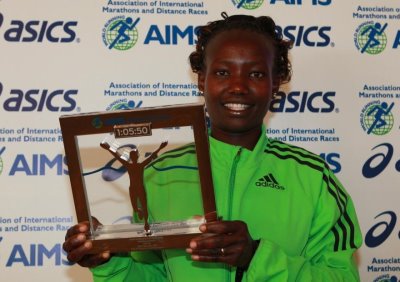 |
|||||||||||||||||||||||||||||||||||||||||||||||||||||||||||||||||
| In 2011
Geoffrey Mutai (30) became the first person in history to win the
Boston and New York marathons in the same year with record times in
both. He won the Boston Marathon in the fastest time ever recorded
for a marathon at 2:03:02, almost three minutes faster than the
course record. However, due to wind assistance and overall drop on
the point to point course this time could not be ratified as a world
record. Mutai returned to Boston in June to compete in the inaugural
B.A.A. 10km where he won in a personal best of 27:19. In November of
2011, Geoffrey won the New York Marathon in a course record time of
2:05:06, slicing 2 minutes and 37 seconds off the venerable event’s
10-year old course record. Mary Keitany joins a very exclusive club with her second AIMS/ASICS World Athlete of the Year award, her first coming in 2009. Mary is one of five female athletes who have won the award more than once. The others are; Lornah Kiplagat (NED, 2 wins), Paula Radcliffe (GBR, 3 wins), Tegla Loroupe (KEN, 4 wins) and Uta Pippig (GER, 2 wins). Mary began 2011 in blistering form, winning the Ras Al Khaimah Half Marathon in a World Record time of 1:05:50. In March she won the London Marathon in a personal best time of 2:19:19, making her the fourth fastest woman at that time over the marathon distance behind only Paula Radcliffe, Catherine Ndereba and Mizuki Noguchi. |
|||||||||||||||||||||||||||||||||||||||||||||||||||||||||||||||||
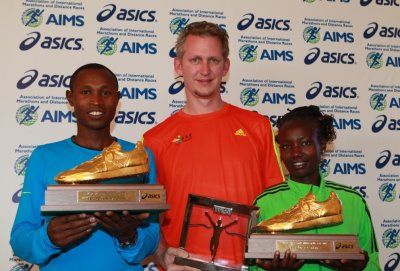 |
|||||||||||||||||||||||||||||||||||||||||||||||||||||||||||||||||
| AIMS President Paco Borao comments: “It is an honour for AIMS to recognise these fantastic athletes with the AIMS/ASICS World Athlete of the Year Award. Both Geoffrey and Mary demonstrated exceptional form last year. It is with great pleasure we recognise their achievements on behalf of the 310 members of AIMS in over 95 countries throughout the world. I would like to give special thanks to Nathan Clayton for his making these presentations possible.” | |||||||||||||||||||||||||||||||||||||||||||||||||||||||||||||||||
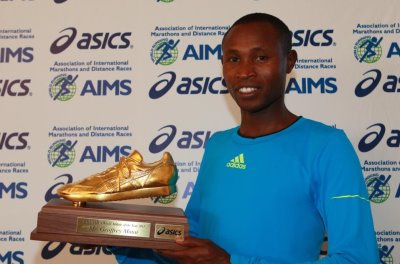 |
|||||||||||||||||||||||||||||||||||||||||||||||||||||||||||||||||
| AIMS
President Paco Borao comments: “It is an honour for AIMS to
recognise these fantastic athletes with the AIMS/ASICS World Athlete
of the Year Award. Both Geoffrey and Mary demonstrated exceptional
form last year. It is with great pleasure we recognise their
achievements on behalf of the 310 members of AIMS in over 95
countries throughout the world. I would like to give special thanks
to Nathan Clayton for his making these presentations possible.” Geoffrey Mutai comments: “I am honoured to win this prestigious award. I know how many great Kenyan athletes have won it in the past and it is a great honour to be in the same compan. I’m happy to be back in the RAK half marathon, which is a great race. For me it’s a good preparation on the way to the Boston Marathon. I would like to thank AIMS, their members and award sponsors ASICS for presenting me with this trophy.” Mary Keitany comments: “To be named as AIMS/ASICS World Athlete of the Year for a second time in my career is an incredible honour. I would like to extend my sincere thanks to AIMS for their support and award sponsors ASICS for this prestigious award.” Race Director, Ras Al Khaimah Half Marathon and AIMS Continental PR Manager for Asia, Nathan Clayton comments: “I am delighted to host this presentation at the Ras Al Khaimah Half Marathon. It is especially pleasing to welcome Mary back to the race where she broke the Half Marathon World Record in 2011 and Geoffrey as a past winner of this event. I would like to thank the AIMS board for choosing this event as the host of such a prestigious ceremony. |
|||||||||||||||||||||||||||||||||||||||||||||||||||||||||||||||||
07 February: We spent yesterday in Sydney with
Richard Donovan writes Fran Seton. He's a crazy Irish lad
who decided that it would be a great idea to run 7 marathons
on 7 continents in under 5 days. Dave (Cundy, my husband),
Bruce Abrahams and I cycled along with Richard and tried to
keep his mind on anything other than running.
Richard wasn’t in the best of shape on landing in Sydney, having not been able to keep anything down for the past few days and suffering from sleep deprivation. I wish I could be that chipper when lacking in sleep. The run was made all the more difficult by the fact that nothing would stay down.... water being the main culprit in the ‘up and under’ situations. Coming to the third and final lap, we were discussing the merits of beer when you have an upset stomach and Richard decided he might like a lager. Dave and I cycled off to the local bottle shop and bought a Heineken. Richard had a wee dram at the start of his last lap and finished the rest off at the turn point, with 7km to go. The beer brought him home. It stayed down, he stayed up and the finish line was in sight. As RichieB would say “marrrrr-vellous effort.” [Or as the old Heineken ad itself used to say: "Refreshes the parts that other beers don't reach"]. |
|||||||||||||||||||||||||||||||||||||||||||||||||||||||||||||||||
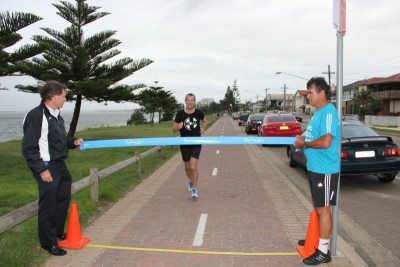 |
|||||||||||||||||||||||||||||||||||||||||||||||||||||||||||||||||
| Sydney was
Richard’s last marathon and here he is at the finish line, in 4 days
22 hours 3 minutes. Please put your hands together for Richard (and
do note the finish tape is that same tape that was used at the
Sydney 2000 Olympics). Richard started last Wednesday and his schedule went: Antarctica – Capetown – Sao Paulo – Orlando – London – Hong Kong – Sydney. Richard averaged around 4½ hours for the first few marathons but stretched it out to 5-5½ by the time he got to Hong Kong and Sydney. Dave had measured a ‘marathon course’ in Sydney, along the shores of Botany Bay. It was a shocker of a day with wind gusts predicted to be up to 40km. It was every bit of that and then some. The course was a 14km loop and the 7km south leg was a killer, complete with sand blasting at points along the way. Of course, the return route was so much easier but still very blustery. |
|||||||||||||||||||||||||||||||||||||||||||||||||||||||||||||||||
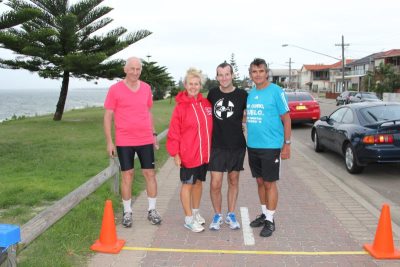 |
|||||||||||||||||||||||||||||||||||||||||||||||||||||||||||||||||
So let’s do
the math......
Leaves me breathless really. When you think of how difficult it
would be to run 7 marathons in just under 5 days without even going
anywhere. |
|||||||||||||||||||||||||||||||||||||||||||||||||||||||||||||||||
|
In the Kagawa-Marugame Half Marathon
(more)
on 5 February Matthew Kisorio won in a
frustrating 1:00;02, but behind him a staggering 24
runners beat 62 minutes, and 47 of them broke 1:03:00.
In the 61st edition of the Beppu-Oita Mainichi
Marathon
(more)
Harun Njoroge ran out a clear winner in 2:09:38. Across
the south China Sea the Kaohsiung Marathon was
held in Chinese Taipei - the first of three marathons in
as many weeks there - and records fell in the
Standard Chartered Hong Kong Marathon
(more)
where Miskier Demissie won the women's race comfortably
in 2:30:12 while Dereje Abera only just got the verdict
over Eliud Cheptei, Cosmus Kyeva and Julius Masei - all
four over the line within a single second. The day's
action finished with the Vadodara Half Marathon
(more)
in the Indian state of Gujarat.
|
|||||||||||||||||||||||||||||||||||||||||||||||||||||||||||||||||
04 February: The third and final edition of the
AIMS CHILDREN'S SERIES held in San Luis Potosi, México
took place on 31 January, with almost 1,000 children
participating, The event was staged in the municipality of
Villa de Reyes, 100km away from the state capital of San
Luis Potosi.
|
|||||||||||||||||||||||||||||||||||||||||||||||||||||||||||||||||
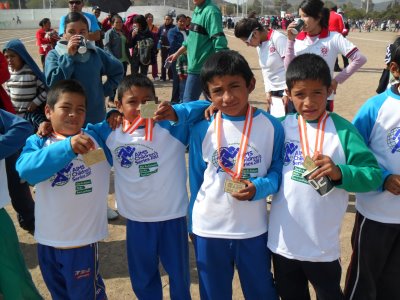 |
|||||||||||||||||||||||||||||||||||||||||||||||||||||||||||||||||
| The children came from more than 50 different communities, and had to travel to the venue to attend the race. For many it was the first time they had traveled outside their immediate community and the first time they had taken part in an athletic event. The opening ceremony was very colorful and animated by a dance prepared by 20 five-year old boys and girls organized by their teachers and mothers. Golden, red, green and blue long sleeved t-shirts crowded the municipality’s sports facility as parents became excited cheer leaders, screaming loud the letters: “A.I.M.S.”. | |||||||||||||||||||||||||||||||||||||||||||||||||||||||||||||||||
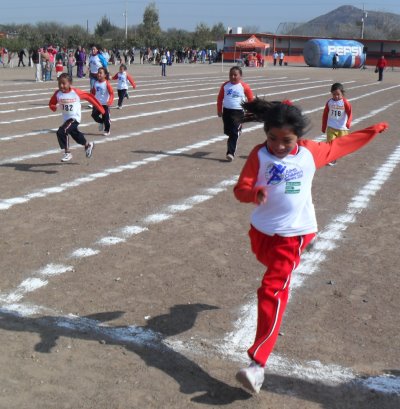 |
|||||||||||||||||||||||||||||||||||||||||||||||||||||||||||||||||
| There were different races for different age groups: 5 years old, 6-7 years, 8-9 years, 10 -11, 12-13, 14-15, and 15-16 years old, each group wearing a t-shirt of designated color. | |||||||||||||||||||||||||||||||||||||||||||||||||||||||||||||||||
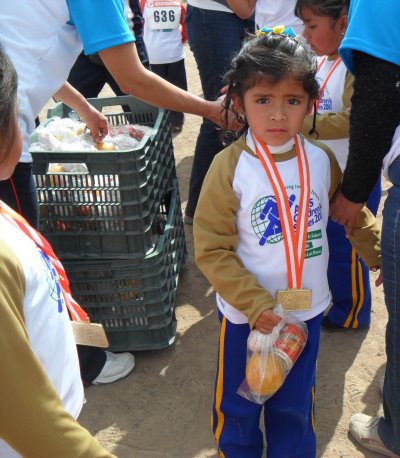 |
|||||||||||||||||||||||||||||||||||||||||||||||||||||||||||||||||
| At the end of each race, each participant received a gold medal, a package with a meal, and Pepsi and Gatorade. All the children were very excited with the toys given as awards for the first three places of each age group, and with the raffles that were held. | |||||||||||||||||||||||||||||||||||||||||||||||||||||||||||||||||
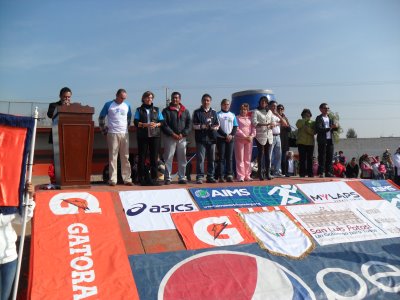 |
|||||||||||||||||||||||||||||||||||||||||||||||||||||||||||||||||
| This
organization received the full support of the Government of San Luis
Potosi through the Governor Dr. Fernando Toranzo Fernandez and the
Family Integral Development System. Other departments of the State
Government, such as Security, the State Secretary, Civil Protection,
and the Sports Institute all contributed to this great joint
project. Support from the State Education Secretary, which provided
the staff in charge of technical issues, was invaluable. The Mayor of the Municipality of Villa de Reyes, Mr. Javier Salazar, made all facilities for the organization of the race available through the municipal departments. |
|||||||||||||||||||||||||||||||||||||||||||||||||||||||||||||||||
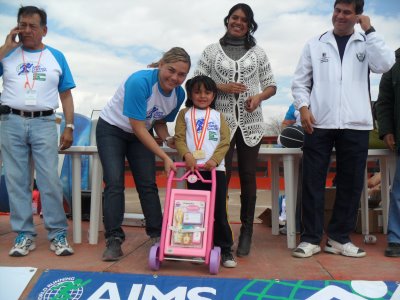 |
|||||||||||||||||||||||||||||||||||||||||||||||||||||||||||||||||
| The purpose of the series was achieved: the sport of running has crossed a boundary in Mexico, as the race made a sporting impact on the community and the series will continue to be organized locally. The children have come to know the feeling of running and begun to enjoy the sport along with their parents and teachers. This Series is likely the beginning of many races to be held in the future, thanks to AIMS, to its members and to the sponsors who made this dream possible | |||||||||||||||||||||||||||||||||||||||||||||||||||||||||||||||||
04 February: The all-time list for the Beppu-Oita
Mainichi Marathon [supplied by Ken Nakamura], the 61st
edition of which is on 5 February, reads like a historical
honour roll. Unlike other richer and faster marathons, in
which all the best times have been recorded more recently by
names that flit momentarily across the consciousness of even
the most enthusiastic Marathon follower, some of this
event's best performances date back decades. Foremost among
these is Shigeru Soh's 2:09:06 winning time in 1978 - then
most likely the fastest time ever run, given the severe
doubts over the accuracy of the course in Antwerp on which
Derek Clayton recorded 2:08:34 in 1969. Many of Japan's top
Olympic performers ran the course and still appear in the
top-10 all time list for the course, including Seoul Olympic
entrant Takeyuki Nakayama and Barcelona runner-up Koichi
Morishita - along with Korean Barcelona Olympic Marathon
Champion Hwang Young Cho. Two other major names of the 1990s
figure in South Africa's Gert Thys - who heads the list with
the course record of 2:08:30 - and four-time winner of the
London Marathon Dionicio Ceron.
|
|||||||||||||||||||||||||||||||||||||||||||||||||||||||||||||||||
|
|||||||||||||||||||||||||||||||||||||||||||||||||||||||||||||||||
31 January: Starting on 1 February Richard Donovan, a
noted ultrarunner and race director of the North Pole and
Antarctic Ice Marathons, will attempt to cover the Marathon
distance on seven continents within the space of five days.
In 2009 he completed the "7 x 7" challenge in five days, 10
hours and 8 minutes. Almost half of the time required is
spent on flights between the selected continental locations.
Donovan will start his epic at the Russian Novo base in Antarctica at approximately 19:00 Sydney time (GMT+11), before flying 4200km to Cape Town (South Africa), then on to Sao Paulo (South America), Orlando (North America), London (Europe), Hong Kong (Asia) and Sydney (Australia). In each stop he will complete the required 42195m on a short, officially measured lap located as close as possible to the airport. The target is to finish his seventh and final marathon by 19:00 Sydney time on 6 February (120 hours). |
|||||||||||||||||||||||||||||||||||||||||||||||||||||||||||||||||
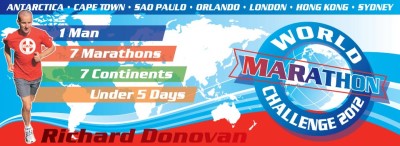 |
|||||||||||||||||||||||||||||||||||||||||||||||||||||||||||||||||
| He will
travel alone with one carry-on bag and, apart from the initial
flight out Antarctica, will fly economy on regular commercial
airline flights. In each location locally-based measurers will
verify that he runs the correct distance. He will typically have
about nine hours in each location to disembark the plane, travel to
the course location, complete the 42195m, travel back to the Airport
terminal, check in and board the next plane. As physical fatigue,
sleep deprivation and flying fatigue accumulate, time pressure will
increase and one late flight could ruin the entire record attempt. Donovan is raising funds to support GOAL's work to alleviate the suffering of people affected by famine and drought in the Horn of Africa. If you would like to donate, please click here: http://www.goal.ie/Donate/88 For further information visit the website: www.worldmarathonchallenge.com |
|||||||||||||||||||||||||||||||||||||||||||||||||||||||||||||||||
|
|
|||||||||||||||||||||||||||||||||||||||||||||||||||||||||||||||||
| Update: Richard Donovan completed the first of the seven marathons in 4:21:11 - a good time for Antarctica, although this was required as the Russians brought forward the time of the flight departure after he had started running. There was snow and ice throughout with the temperature "only" -10 at its coldest. His second marathon distance of the series, on the course of the Cape Town Marathon was covered in 4:23:51, in windy weather. From Cape Town he flew to Sao Paulo for his third marathon distance. He completed his fourth marathon in Orlando in 04:44:27 and recorded 4:32:45 in the fifth venue, London, where he ran at Clapham Common with temperatures ranging from -3 to -6C. From here on he began to have problems and as a result of fatigue and sleep deprivation was unable to keep food and liquids down. He reported feeling quite ill on arrival in Hong Kong, but on the afternoon of 5 February completed the marathon distance on a lap run on a cycle path at Tung Chung, close to the Airport, in 5:03:05. The final Marathon in Sydney took him 5:21:40, giving him a total elapsed time for the seven Marathons (and traveling between them) of four days 22 hours and 3 minutes - one hour and 57 minutes less than five days. |
|||||||||||||||||||||||||||||||||||||||||||||||||||||||||||||||||
|
In the Osaka Women's Marathon
(more)
on 29 January Risa Shigetomo was a surprise
winner in 2:23:23, as race favourite Kayoko Fukushi
slumped to ninth place (more). On the same day the
Khon Kaen International Marathon
(more)
was held in Thailand, and the Marathon et Semi
Marathon International de Marrakech
(more)
in Morocco.
On 27 January the Standard
Chartered Dubai Marathon
(more)
yielded superfast times, with Ayele Abshero (2:04:23)
heading four Ethiopians who broke 2:05 and Aselefech
Mergia defending her title in 2:19:31, three seconds
ahead of Lucy Kabuu. Mare Dibaba also went under 2:20. |
|||||||||||||||||||||||||||||||||||||||||||||||||||||||||||||||||
27 January: With 128 days to go till South Africa’s
most arduous road running event takes centre stage, the
Comrades Marathon Association (CMA) is going the extra
mile to ensure that runners are adequately prepared for the
challenge. The 87th running of this amazing sporting fixture
will be a down-run from Pietermaritzburg to the coastal city
of Durban on 3 June 2012.
The CMA will hold a series of free information sessions and workshops across the Rainbow Nation, in order to empower runners with the necessary training and injury prevention tips that will not only see them to the start but also take them through the finish line. Many runners have credited these workshops for their successful performances on race day. CMA's Marketing Coordinator Thami Vilakazi says: 'The workshops are exciting, innovatively presented and up-to-date. I would urge all runners to attend these sessions as they will definitely benefit from them. The Official Comrades Coach, Lindsey Parry, and the team will answer all questions regarding next year's race and advise novices and experienced Comrades runners alike on how to build themselves up for peak performance.' |
|||||||||||||||||||||||||||||||||||||||||||||||||||||||||||||||||
|
On 12 January Patrick Twanbe set a new course
record in the 35th edition of the Tiberias Marathon
(more)
and four athletes finished the marathon under 2:08:00.
Patrick Twanbe from France got his revenge from coming
in second at the 2011 Tiberias marathon, losing the race
in the last 500m. This year, he not only took first
place but he set a new course record of 2:07:30.
On 15 January the China Coast Marathon (more) took place in on a tough course in the New Territories of Hong Kong, The Standard Chartered Mumbai Marathon (more) was run in India and the Bahamas Marathon (more) on the fringes of the Caribbean. |
|||||||||||||||||||||||||||||||||||||||||||||||||||||||||||||||||
|
|||||||||||||||||||||||||||||||||||||||||||||||||||||||||||||||||
|
In the the Xiamen International Marathon
(more)
on 7 January Peter Kamais and Ashu Kasim posted
the 2012 early bird times to beat with wins in 2:07:37
and 2:23:09 respectively. In the men's race the top six
were 2:09:45 or faster. Several thousand kilometres to
the northwest the Siberian Ice Half Marathon
(more)
took place in Omsk, western Siberia, in an expected
temperature of around -20C.
|
|||||||||||||||||||||||||||||||||||||||||||||||||||||||||||||||||

